
Essay About Being a Student: Top 5 Examples and Prompts
Read an essay about being a student to learn how you can write your paper about the topic. Here are essay prompts for anyone who doesn’t know where to start.
Life’s challenges are different when you are a student. Being a student isn’t only about focusing on academics or your future. It’s also about balancing your social life, health, and relationships. Sometimes, peer pressure can push you to make bad decisions. Other times, your years as a student will be your most memorable ones.
We listed five essays to read for students who want to write essays about being a student.
For help with your essays, check out our round-up of the best essay checkers.
1. Essay on Student Life by Toppr
2. education and student life by lindsey buchanan, 3. short essay on the life of a student by bunty rane, 4. international student life by lillian thornton, 5. my life as… and international student by charlotte, 1. being a high school student, 2. using online learning tools, 3. relationships built as a student, 4. most popular sports among students, 5. being a student scholar, 6. peer pressure among students, 7. hollywood vs. reality: the high school experience, 8. being a student and a mom, 9. going back to finish school.
“One of the most exciting things about student life is getting to go on picnics and trips with your friends. You get to enjoy yourself and have a lot of fun. Even waiting for the exam result with friends becomes fun.”
This essay describes the essence of student life and what the writer learned from being a student. The essay includes many positive and negative experiences that are fun and worthwhile.
“Student life is the best part of an individual’s life. At this time, our main task is to study. We should stop thinking of anything else and concentrate on education.”
Buchanan discusses the importance of students and student life. She explains what students must do to survive this life, what they’ll typically undergo, and how to be a good student.
“Fun increases after real hard work, and you tend to enjoy [it] more than those who had been lazy and have wasted their time. I think this period of your life is [the] most wonderful period – full of spontaneity, dreams, and hope, not a care in the world, except for studying.”
Rane’s essay on being a student describes what students typically do, based on the writer’s experience. For example, students can get lucky, scolded, bored, and have fun. The essay also detailed how students respect teachers, pass exams, and learn discipline.
“Studying in America has a lot of advantages, such as we can learn [about] new cultures. But studying in [a] different country is a difficult thing for [a] teenager.”
Thornton is an international student from China who describes the difficulties of studying in the United States. In her essay, Thornton describes the advantages of being in the US and exposing herself to a new culture.
“Being an international student is kind of a double-edged sword. A lot of time, I love the attention.”
Charlotte’s essay focuses on her experience as a British student studying in the United States. She shares how being a student is like being a celebrity in negative and positive ways. She also shared the culture shock when she saw how different it was to study in another country.
9 Prompts on Writing and Essay About Being a Student
Are you ready to write an essay about being a student? Share your student experience through essay writing with the prompts below. Use them as your focus, theme, or starting point.
The years you spend in high school are often a memorable time for you. A high school student’s life revolves around the friendships they make, puberty, and peer pressure. Yet, most people don’t even remember their grades in high school when they reminisce about it.
Use this essay prompt to give life to your high school story as you remember it. If you’re still in high school, this topic is an excellent choice for you to describe how you feel like a high school student.

Using online tools for distance learning is one of the adaptations we had to make to avoid spreading the COVID-19 virus. Today, many schools still use online learning resources, changing the experience of many students.
How do you like online learning versus face-to-face classes? What are the pros and cons of each education style? Answer these questions in your essay about being a student in post-pandemic times.
The common relationship made in school is friendship. Some students find romantic relationships in school, but most people experience friendship.
You can describe the different levels of relationships you’ve built in school as a student, whether as acquaintances or best friends with a person. You can also extend this to non-students, like the school staff and team or club members.
Many students make it through their education by maintaining athletic scholarships. Whether you’re an athlete or a sports-spirited student, you know which sports are most popular among the student body.
Describe the most popular sports in this essay and why they are so loved by students. You can also discuss how other sports programs might gain popularity and attract more athletes.
If you’re still stuck, check out our general resource of essay writing topics .
Student scholars are students who receive a scholarship that provides financial aid for their studies. Financial aid can come from the university or other organizations, covering tuition fees, learning equipment, and more.
With this essay topic, you can detail what it’s like to be a student scholar. Describe the challenges you face and the benefits you receive.
Peer pressure is most powerful and influential to middle and high school students. This is because teenagers typically want to fit in and feel admired by their peers. Sometimes, it also extends to the college or university level. Discuss how you handled peer pressure, how it is so powerful to students, and how others could manage their reactions to it.
From Mean Girls to High School Musical, the Hollywood high school experience has been extremely exaggerated. In reality, the student hive doesn’t mindlessly idolize a queen bee, fall into specific stereotypes, or burst into song.
Hollywood is abundant with unrealistic portrayals of the US high school experience. Debunk these tropes by writing about your high school experience.
Traditionally, women must finish their studies before they start a family. Many, but not all, female students who get unplanned pregnancies continue their pregnancy and raise their children in reality. Finishing one’s education is already a huge challenge in itself.
The experience becomes even more challenging when a baby or young child gets added to the mix. If you’re a single mom and a student, this is the essay topic most suitable for you.
Not all students had the choice or privilege to finish their studies. Walt Disney didn’t finish high school, while Mark Zuckerberg and Steve Jobs didn’t finish college. Instead, they pursued their dreams and found success. Other people don’t have the same luck or make the same choices.
Others have risked school for bad decisions or miscalculations. No matter the outcome of leaving school, it’s still a good decision if you have come back to finish it. Use this essay topic to write about what it’s like to go back to school to finish it.
If you’re stuck picking your next essay topic, see the following essay topics about education .

Maria Caballero is a freelance writer who has been writing since high school. She believes that to be a writer doesn't only refer to excellent syntax and semantics but also knowing how to weave words together to communicate to any reader effectively.
View all posts
- Tuition Insurance
- Renters Insurance
15 College Student Benefits You Might Not Know About

College is a unique time in life. When else will you be surrounded by people your own age, and study among people with your same academic interests? It’s the time when you’re existing in that state of not being a kid anymore, but not quite being a grown adult yet either. But did you know that college is also a time when you can get tons of discounts and rewards just for being a student? Businesses and schools have perks for students that a lot of people don’t know about. Here are 15 that are definitely worth checking out:
1. Amazon Prime Student If you’re an online shopper, this one’s for you. By signing up with Prime Student , you’ll be offered a variety of exclusive discounts, and get six months of free two-day shipping on eligible purchases. You’ll also qualify for Amazon Music with no ads, for $0.99 per month, and unlimited streaming of Prime Video.
If you’re looking for a one-stop-shop for student discounts, look no further than UNiDAYS . Sign up with your university email address, and you’ll have access to more than 150 deals and discounts on clothing, technology, beauty, health and fitness, and more. Save on big brands including Samsung, Ray-Ban, and Adidas.
3. College nights Where there are colleges, there are discounts. Local businesses often try to attract students by offering special college nights. Many movie theaters, museums, and the like host nights where you can get discounts just by having a student ID. There’s also often two-for-one deals on occasions like these. It’s a great way to go out on the town without going broke, just check with the student affairs office for a list, or browse your campus newspaper for ads!
4. Computer cost cuts College is a huge expense, and buying a laptop for school can be pretty pricey too. Luckily, companies like Apple , Dell , HP , and Microsoft offer discounts just for college students – some even include a cool freebie if you buy a laptop in time for school, like an iPod or an XBox. Do not forget this when you’re computer shopping!
5. Chat it up on your cellphone Phone companies like Verizon, AT&T, Sprint, and T-Mobile can get you discounts on your monthly phone bill. If your school makes you eligible for these discounts, take advantage!
6. Join gyms for less Most colleges offer the perk of having a free gym on campus, but if you prefer to use an outside gym, there’s good news. There are many gyms that offer discounted memberships for students. Gyms like 24 Hour Fitness Planet Fitness , and Gold’s Gym offer student discounts at select locations across the country.
7. Travel on a budget Want to take a trip over winter, spring, or summer break? Make sure to do your research to find student discounts first. Student Universe is a website that gives college-friendly prices on airfare, hotels, attractions, and more.
8. Smart shopping If you need to get a couple outfits for a new internship or job, listen up! Stores that carry professional-looking outfits can be pricey, but there are some that will give you a discount for as long as you’re in college. For example, Ann Taylor, Banana Republic, Club Monaco, and J. Crew offer 15-20 percent off perks when you show them your school ID.
9. Keep your identity safe Identity theft is so prevalent these days that some colleges are taking proactive preventative measures to keep their students safe. One such school is Iona College, which provides identity theft protection for all their students.
10. Get subscriptions for less Think keeping up with a newspaper or magazine might be helpful for a class, or just want to read it for fun? Students can get significant discounts from publications like The Economist , The New York Times , and The Wall Street Journal . Your campus may even offer these publications free for students – check with student affairs to see what they offer. So read up!
11. Get deals going out to eat Just like retail stores, there are many restaurants that offer discounts for college students. Maybe there’s a certain day of the week when students get discounts, or maybe it’s even an everyday thing. Many chain restaurants offer student discounts, but don’t advertise it. When in doubt, ask! Here is an infographic that lists some of them.
12. Health plans More than 800 schools offer group student health plans, making it convenient to get health-related benefits. Such programs can give students access to coverage that might not otherwise have access to.
13. Save on books with Chegg Textbook costs can definitely add up over the course of one semester, let alone four years. Luckily, websites like Chegg have student services that offer big savings for renting or buying books. They can even help you sell your books back.
14. Savings on moving costs Take away some of the stress of moving knowing there are discounts on trucks and storage. Budget and Penske offer students 10 to 20 percent off your move. For Budget, just enter code TRUKU at checkout. For Penske, snag this deal by using the code STUDENT. Need to store your stuff for summer? Smartbox Moving and Storage provides portable storage containers that can be picked up and delivered to a new residence or safely stored until needed. Check out their student discounts here .
15. Student Advantage Did you know that there are discount programs for college students that get you national and online deals? Student Advantage is the largest student discount program, and offers discounts from Amtrak train tickets, booking on Expedia, magazine subscriptions and online shopping. It’s another one-stop place for collecting your discounts.
This article was previously published in October 2012 and has been updated.
Related Posts

Using a Course Syllabus to Prepare for the Semester
- Julia Shuruyeva
At the beginning of each semester, college students receive mountains of paperwork and documents to…

10 Crucial Campus Safety Tips
- Guest Contributor
- September 24,
The yearly return to college each fall is an exciting and significant time for students,…

What Should You Pack For College?
- Paul Pennelli
Wondering what to pack for college? Packing for college can be EXTREMELY overwhelming, especially if…

4 Ways To Get Involved Your Freshman Year
- Kyle Latronico
If you have ever been to a major college campus during the school year you…
Perks of Being a Student: The Free Facilities Your College Offers
You are so lucky to be a student! Even if you might not think so, give it time. You’ll get there.
Your student years are probably some of the most interesting of your life. You meet so many people, learn something new every day, and have so many fun opportunities.

Colleges provide students with accessible sports facilities, libraries, and student clubs.
Haven’t found your passion? Try everything! Your options are endless.
Being a student means that you get special student discounts and services. We have prepared a selection of freebies and benefits available to students. Check them out.
- 🎓 College/University Facilities
- 🎢 Top 8 College Facilities
- 💸 Other Discounts & Deals
💻 Where to Find Student Deals
🎓 what can your college or university provide.
It’s time to explore your college and what it has to offer!
Take a look at the facilities below – chances are your institution has them too. Check their website to be 100% sure.
Counseling & Peer Support
Juggling study, extracurricular activities, and personal problems at the same time can be challenging. That is why so many institutions pay attention to the mental health of their students. Therapy is mostly free or not as expensive as you might think.
Counseling is a great tool. Remember that going to therapy doesn’t mean that something is wrong with you. It means you are being proactive in caring about your health and well-being.
Career Counseling
Every university wants to make sure that its graduates succeed in the future. Career counseling is your chance to choose something you truly enjoy doing.
A counselor will help you evaluate your current skills and strengths, and focus on developing your talents. You will learn what career opportunities are available to you. You can also share your plans, thoughts, and feelings. Doing so can help a counselor identify personal factors influencing your career.
Even one session can assist you in organizing your studies and defining a career path. It is definitely worth trying!
Language Center
Don’t worry if English is not your native language. Most colleges offer ESL courses that help improve English proficiency. Typically, there are different courses for various levels. Most of them focus on preparation for academic study at American universities. A great bonus: you will get plenty of speaking practice in your free time.
Taking a language course is probably the fastest way to learn English and adjust to American culture. Some courses also involve activities, events, and trips. You might meet your future college friends and have a lot of fun!
Academic Advising
The purpose of academic advising is to assist you with your studies. It includes:
- Educating students on degree requirements. They will help you with your major choice and successful degree completion. You also might need help to ensure you choose courses that match your academic goals.
- Help with your academic and career plan. This is an excellent opportunity to learn more about particular subjects, earning credit, research fields, and international exchange programs.
- Information about available internships. You can start building your career while still at college if you choose the right internship.
- Help with your academic concerns. Academic advising is needed if you have a problem with a particular class or other troubles related to the studying process.

Libraries and Computer Labs
All universities have libraries and computer labs, but do you know how to use them to their full potential? Most colleges provide main libraries and thematic ones, depending on the college’s focus. You can find rare manuscripts, book collections, and pieces of art there. A library is a perfect self-study and coworking place.
Computer labs provide students with laptops, tablets, stationary computers, free software, and tools. Don’t hesitate to ask for help if you can’t find what you are looking for.
Disability Services
Modern colleges aim to create inclusive environments. That is why they equip campuses with offices and services with assistive technologies for various diverse needs. Some colleges also offer professional tutors and trainers. You can find out more information at your college’s disability services office.
Here is a list of some services that may be available:
- Note-takers for lectures held in class.
- Audio recordings of lectures.
- Sign language interpretation.
- Special exam conditions such as distraction-reduced rooms.
- Course substitutions.
- Sound amplification.
- Extra time for tasks.
- Priority class registration.
Student Clubs, Societies, & Unions
It is a perfect opportunity to spend your free time on campus with pleasure and benefit. Student organizations have multiple purposes, the primary goal being to unite like-minded people.
You can choose to join an academic club to enrich your knowledge and build career opportunities. Media organizations are perfect for developing your creative skills. Cultural societies offer a chance to meet people with similar backgrounds.
Recreation and sports clubs cover all types of activities. You can even get involved in government and community service to engage in civic activities and advocate for students. There are also religious and spiritual communities.
Spiritual Guidance
Universities support students of all faiths, religious or non-religious. Religious accommodations are available at most colleges. Typical faith and worship facilities on campus might be:
- Prayer rooms. These spaces are perfect for prayer, meditation, and reflection.
- Student clubs. They provide an opportunity to make friends, celebrate festivities together, and share your knowledge and experiences.
- Religious directors or faith leaders. If you seek advice, guidance, or support – these people are ready to talk to you.
- Facilities near campus. Colleges can recommend local places of worship.
🎢 TOP 8 Student Facilities Compilation
Here is our selection of the most exciting perks particular universities have to offer. Check the information below; maybe your college provides the same opportunities?
Unlimited Meals at Kenyon College
Kenyon College students dine in the enormous Pierce Hall, which consists of three dining areas. During the academic terms, students can enjoy unlimited meals according to their board plan. The only exceptions are Thanksgiving and spring breaks.
Several culinary stations serve different types of food:
- International cuisine.
- Hearth and fusion dishes.
- Vegetarian and allergy-sensitive options.
They also choose healthy organic food. Almost a half of it comes from a 40-mile radius out of campus. The menu changes three times a year, and students can suggest menu revisions.
Aquatic Center at University of Missouri
Want to swim?
Many universities have pools, but…
This is the perfect place for athletes, swimming enthusiasts, and sunbathers. Mizzou Aquatic Center comprises four pools that are perfect for competition, leisure, and recreation. It opened in 2005 and is still one of the premier aquatic facilities in the United States.
There is a 50-meter pool and 25-yard diving as well. Both have ultraviolet disinfection systems that provide better air and water quality.
Outdoor Center at Western Washington University
Do you like active time spent outdoors?
The Associated Student’s Outdoor Center is excellent for active people who love sports and seek adventures. You can find various outdoor activities, including sports opportunities and excursions.
Bike rentals and challenge programming are also available for students, staff, faculty members, and alumni. There are educational resources focused on sustainability and enriching the academic experience. If you want to learn how to deliver first aid or wilderness medicine, this is the right place for you to develop these skills.
Dairy Bar at South Dakota State University
What about the best ice cream in South Dakota?
SDSU Dairy bar offers more than 60 flavors of homemade ice cream and sherbet. Students manufacture this cow-to-cone ice cream and guarantee its quality. If you want to purchase a half-gallon container of your favorite treat, here’s the place to do it!
You can also try a variety of homemade dairy products and have a cup of coffee as well.
Birthday Cakes at Ohio University
It’s Birthday Club!
Parents can buy a giant cake or cookies for their children who live in Ohio University’s residence halls. For only $22, you can choose a 9-inch double-layered birthday cake or a chocolate chip cookie of the same size. You need to place the order at least two weeks before the delivery date.
A student receives an e-mail with greetings and can pick the cake at any dining location on campus.
Health and Wellness Center at Rice University
It’s time to take care of your mind and body!
Rice Recreation offers various activities which aim to promote the benefits of physical activity. You can experience all the physical, social, and emotional benefits at the center. It offers fitness and wellness programs, two swimming pools for recreation and competition, a gym, and even outdoor trips.
The center is available for all students, faculty, and staff. Whether you are a competitive athlete or just want to be healthy, you will definitely enjoy this facility.
Ski Area at Michigan Technological University
A ski resort owned by a university? Well, why not?
Mont Ripley is only one mile from the Michigan Tech center. It offers 24 ski trails and six Glade Runs. In addition, there is a tubing park, terrain parks with jumps and slides, and powder bowls. The place is perfect for pros, amateurs, and beginners. You can ski at night if you want to. There are also restaurants, nightclubs, and shopping options nearby.
Gadgets at Full Sail University
What is the LaunchBox project ?
It is an excellent opportunity for students to build their portfolios. LaunchBoxes are a unique set of equipment and software created for different degree programs. There are options for students who study digital cinematography, music production, game art, game design, and sports marketing and media. The cost of it is a part of tuition, and students typically receive it in the second year of their studies.
💸 Discounts & Deals from Big Companies
There are also perks outside your college.

Plenty of deals are available both online and offline. Here are just some of them:
Shopping Discounts
A vast number of companies offer student discounts, for example, corporations such as Apple. It is essential to check the updates all the time. Discounts for students are available for clothing, beauty and health products, electronics, restaurants, and home décor.
Here is our list of favorites:
- Apple has a variety of discounts and special offers for students . You can buy Mac and iPad models with discounts or receive AirPods as a bonus for your purchase.
- Adobe Creative Cloud offers subscription discounts for students and teachers . It is only $19,99 for all apps, while the regular price is $52,99.
- Levi’s gives a 25% discount when you join UNiDay s. You need to spend a couple of minutes verifying your student status to get access to the deal.
- Samsung has an education discount program . You can save up to 30% on laptops, tablets, smartphones, and other purchases.
- ASOS offers a 10% student discount . After student status verification, you will get a student discount code that you can use till graduation.
Online Subscriptions
Many popular online services offer discounts for students and teachers. These include:
- Apple Music . A student subscription allows you to listen to your favorite music for $4.99 a month for up to 48 months. You also get free access to AppleTV+ for a limited time.
- Spotify . At first, you can stream for three months for free, and then you pay $4.99 a month with your student discount.
- YouTube Premium. After a one-month free trial, you get unlimited music and video streaming without ads for $6.99 a month.
- Hulu . You can enjoy your favorite shows and series for just $1.99 a month instead of $5.99.
- Amazon Prime . Amazon Prime offers a 6-month trial and then a 50% discount. There are also regular extra savings and deals.
Entertainment
Are you a fan of movies or museums?
Student discounts apply to movie theaters, museums, theaters, sports events, and party supplies. Some museums are even free of charge if you show your valid school ID. Here is what we’ve found for you:
- AMC Theatres . Just bring your student ID to the box office to get a discount.
- Angelika Film Center. You can buy your ticket for $11.50 and get free popcorn every Tuesday with your student ID.
- OTL Seat Filler Club. This club offers a discounted plan for Preferred-level members, which includes students.
- Packed Party . You can get a 15% discount on accessories, party, and office supplies.
- The Metropolitan Museum of Arts. Like many American museums, it offers a 50% discount for students.
You can get a discount on your medical and car insurance, cell phone service, and transport. Check out your local public transport website. They also might have something to offer.
Take a look at these services:
- Bank of America . No monthly fees for students.
- Cigna . You pay just $100 a month for your health insurance.
- IMG . This is the best option for international students offering long-term and short-term insurance plans.
- AT&T . You need to register with your .edu e-mail to get a discount of $10 per month for a line.
- Sprint . College students that participate in the discount program can get a discount for mobile service. Check if you are eligible on the website.
What else is there? Don’t forget to register on UNiDAYS to get updated discounts for hundreds of stores.
Here are our last picks:
- Petolon . An app that provides HIIT training, yoga, running, cycling, and various other options for students for $7 a month.
- Groupon . With Groupon Select Student Program, you get an extra 25% off food, drinks, and entertainment.
- CheapOair.com . Website offers discounts on selected domestic and international flights.
- OneTravel . You can save $10 on travel expenses, including flights, hotels, and vacation packages.
- AbeBooks . You can get new and used textbooks at low prices.
Here’s our list of sites where you will find available offers.
- UNiDAYS – Fast, free, exclusive discounts for students
- 100+ Best Student Discounts for 2023
- Best deals, discounts and freebies for college students in 2023 – CNET
- Student Discounts – Save the Student
- Student Discounts 2024: 180+ Brands That Offer Discounts (USA)
We hope you’re feeling excited about all the perks of being a student.
The more you try, the more choice you have.
That’s it for today. We hope it was helpful.
Share a unique perk of your college in the comments below.
- Share to Facebook
- Share to Twitter
- Share to LinkedIn
- Share to email
![the perks of being a college student essay Meeting Deadlines: A Comprehensive Guide [Tips & Infographic]](https://custom-writing.org/blog/wp-content/uploads/2021/07/flat-lay-desk-calendar-clock-284x153.jpg)
There are countless articles online that teach you how to meet deadlines. However, most of them only provide general strategies. In this article, we’ll focus on the root of the problem instead of the minor issues. We’ve prepared a complete guide to turning your assignments in on time and meeting...
![the perks of being a college student essay Getting the Most out of Career Fairs [The Complete Guide]](https://custom-writing.org/blog/wp-content/uploads/2021/07/company-representatives-reading-applicant-resume-hiring-284x153.jpg)
One of the biggest problems for any student is not knowing what to do after they leave college. Career fairs are the best way to overcome this obstacle. They provide the opportunity to train your business and interpersonal skills, and also showcase both your strengths and weaknesses. This article by...

It’s already decided that you go with the PTE exam, and you need to start getting ready. Don’t know what to begin with? There are four parts of the test that check different skills: Reading Writing Listening Speaking Ideally, it would help if you practiced all of them regularly. However,...

Imagine you have a month to get ready for your PTE English exam. Moreover, you have no time or money to attend any PTE preparation courses. Is it still possible to use this last month wisely? This Custom-Writing article offers you a well-thought strategy to make the most out of...

The TOEFL iBT assesses a taker’s ability to use and understand English at the university level. It focuses on and evaluates listening, reading, speaking, and writing skills in an academic context. Passing the TOEFL iBT test is not an easy task. If you plan to take the test, it is...

As soon as you decide to do something (for instance, take a TOEFL test), you set a specific deadline which you swear to keep up with. However, days pass and turn into weeks while you haven’t even started doing anything. Sounds familiar? Don’t worry. You are not the only one....

If you are planning on going abroad for a specific purpose like studying or working, you will need to pass some kind of English language test. It is especially relevant for those looking into colleges in English-speaking countries. PTE exam is one of the best choices: It was designed for...

Are you about to start your IELTS preparation? Don’t know which resources to choose? Read the following article, and you will find out how to prepare effectively. It includes: A list of valuable and trustworthy IELTS books;Top 3 websites and best IELTS preparation apps for you to practice anywhere and...

IELTS stands for International English Language Testing System. Simply put, it’s an exam that measures your English language proficiency. You’ll need it if you want to move to an Anglophone country. The exam is owned by the British Council, IDP Australia, and the University of Cambridge. You may think it’s...

So, you are going to take IELTS. But, have you chosen which one of them to take? There are, in fact, two types of IELTS: Academic and General Training. They differ in structure and some other aspects. The choice is all about your goals. Want to study abroad? IELTS Academic...

This article is your ultimate guide to taking the IELTS test. Here you will find many helpful IELTS tips and tricks on how to do well in this exam. It is worth mentioning that listening and speaking sections are the same for the Academic and General Training tests, while reading...

Do you want to live or study in an English-speaking country, but English is not your first language? You most likely need to pass a proficiency test. It aims to assess your reading, writing, listening, and speaking skills. Which test to take? That’s a good question. It all depends on...
Thank you for sharing this post and I hope keep posting more articles.

Thank you for your attention. It means so much for us!
1.1 What Are the Benefits of College?
Questions to Consider:
- Why is college a good opportunity to become a learner?
- How can a college education help me develop as a person?
Usually, when we talk about the benefits of college, we make the argument that people who graduate with a degree are more likely to earn higher salaries or amass more lifetime earnings, experience better health and wellness outcomes, and embrace a more positive outlook on life. However, there are more rewards for going to college than just these long-term gains. In fact, you may have already identified a few that are motivating you to consider college: You get to study topics and develop skills that interest you; you get to live on your own (or with a roommate); and you get to have more control over what you do and when you do it. These are all good reasons to go to college, but there are other ways that college can benefit you.
College Allows You to Become a Learner
In his book, Becoming a Learner 1 , Matthew Sanders (2018) makes the argument that the fundamental purpose of college is not to fill you with specific knowledge or give you a set of career skills that you can take with you directly on the job. Its purpose, instead, is to help you “become a learner.” Sanders points out that learning to learn while taking a variety of required courses will help you develop the very skills that will help you reach your long-term goals and adapt to the changing world of work after you graduate.
According to Sanders, your time in college is best spent if you approach the courses that you are taking as opportunities to develop your learning skills and your character. In other words, college will give you the chance to challenge and ultimately strengthen your values and beliefs, develop an awareness of who you are and what you want, embrace and learn from adversity, and demonstrate integrity and work ethic. College is not the only place for you to grow in these ways, but it is specially designed to allow you to do so with minimal repercussions.
In order for you to make the most of the college experience, consider making the shift from student to learner by adopting the behaviors and habits that are presented in Table 1.1 .
Becoming a learner doesn’t happen overnight if you have had the habits of a student for many years. It will be a process of determining what your professors expect of you and making changes to your approaches to learning. In some cases, you may fail a test, an assignment, or a course. But those experiences will be helpful to you if you choose to see them as additional educational opportunities.
College Allows You to Explore and Grow
In addition to helping you become a learner, college is a good place to explore who you are and who you want to be. Experts in student development theory believe that your early adult years (ages 18-23) are the optimal time to determine your values, beliefs, and goals—or at least work through the options and learn more about what you like and don’t like. Two researchers developed a theory about the ways in which students in college develop. Arthur W. Chickering and Linda Reisser (1993) published their theory of identity development 2 for young adults. While it sounds mysterious, plainly stated, it is a theory about how and in what capacity you will grow and change while in college. The following seven components, or “vectors,” of the theory can provide you with a preview of what you will experience:
- Developing competence . This means that you will improve as you gain knowledge and skills through learning activities and through challenges and setbacks.
- Managing emotions . You will get many chances to learn how to identify how you are feeling and why and act on those emotions in a mature way.
- Moving through autonomy to interdependence . This sounds like a complicated process, but it refers to your ability to become an adult in all ways by taking ownership of your choices and their consequences and for recognizing that you have a role in society to ask for help and to help others.
- Developing mature relationships . In college, you will get many chances to establish relationships with a variety of different people—professors, mentors, classmates, friends—and you will benefit from learning how to communicate clearly and openly.
- Establishing identity . Each one of us has multiple identities, or lenses through which we view ourselves and the world. College allows you to explore those identities—and maybe even discover new ones—and develop your sense of self and improve your self-esteem.
- Developing a purpose . Setting goals, seeing yourself as someone who wants to help others, demonstrating a commitment to your future are all parts of developing a sense of purpose. In college, your courses, interactions with professors and classmates, and participation in activities will help you develop a sense of purpose.
- Developing integrity . This is more than just doing the right thing. Integrity includes living your values and beliefs and respecting the values and beliefs of others.
Now that you have an idea of how college will likely change you and help you grow as a person, let’s look at the opportunities you will have to move through these stages during college.
College Courses
Whether you decide to earn a certificate, associate degree, or a bachelor’s degree, you will take courses not related to your intended major. In some cases, you may have to take 10 or more courses in a variety of areas (or disciplines). These courses are often referred to as “general education courses,” but other names include “core courses,” or “liberal arts courses.” Each higher education institution is different in how many and what courses they require. You may have to take courses in writing, mathematics, sciences, arts, humanities, and social and behavioral sciences such as psychology or sociology. These courses may seem to stand in your way of learning about topics that directly relate to a major, but they are important to helping you develop yourself as a learner and build competence in your skills. When you register for classes once you are admitted to college, view your first academic terms as an opportunity to explore different topics and push yourself outside your comfort zone. You don’t know why taking a biology class will help you if you are a business major? Recall the section above about becoming a learner: adopting a “learner” mindset can help you frame the experience productively. Instead of feeling disconnected from such a course when your major is something different, think about how scientists, and their ways of thinking, provide us with ways in which to improve our health and environment. Or think of taking these courses that are not aligned with your major as opportunities to develop a broad range of learning and thinking skills that you will rely on for the rest of your life. At the very least, you will be a stronger learner and at the most, you may discover that what you really love to learn is something you had never considered studying before.
Organizations and Extracurricular Activities
During high school, you may have participated in school activities and organizations for the social aspect, for the opportunity to effect a chance and serve the community, or for the ability to develop important skills. These reasons don’t change much when you go to college. Most institutions offer a wide variety of clubs, organizations, societies, and Greek fraternities and sororities for the same reasons: to help students develop socially, personally, and professionally. Once you determine where you are going and what you will be studying, you will also want to take the time to decide how, what, where, and when you want to get involved. There is a balance, of course, and you don’t want to be so involved socially that you forget to go to class! Instead, look for organizations that fit your interests and find out what the commitment level is. Some will be very casual, meeting only once a semester or only for social interaction. Others will be more involved and may even cost a considerable amount of money each term (e.g., fraternities and sororities). Even before you choose an institution to attend, check out their list of opportunities to get involved. Then, when you make your choice, make a goal of exploring your options further. Here are some things to consider:
- Making friends . You will most likely find many clubs and organizations that serve as social gatherings, usually organized around an interest or hobby. A film appreciation club, for example, could be a great way to meet people and enjoy something you like to do, like watching movies.
- Exploring your values and beliefs . Most college campuses have faith-based or politically-affiliated groups that give you the chance to connect with others who share your values. Consider pushing yourself outside of your comfort zone, however, and look for groups that also provide a different perspective.
- Developing leadership skills . One of the benefits of participating in clubs and organizations is that you can have the chance to develop key leadership skills. Most groups need a leader or several to carry out their missions. Student government associations or councils or advisory boards are great ways to get involved in significant ways.
- Staying physically active . A climbing or hiking club or intramural sports are great ways to incorporate physical activity into your life. If you want to learn a new skill or sport (pickleball, anyone?), these are good ways to try them out.
- Improving communication and project management skills . Any group you join will most likely have an event they put on or participate in, and your involvement will allow you to grow as a person in meaningful ways and help you develop career skills.
Setbacks and Failure
You will read more about how to deal with adversity throughout the rest of the chapters of this book, but it is worth mentioning here how setbacks and failures can help you to learn and grow. You may have already had some experiences with stumbling academically or personally up to this point. While it seems cruel to suggest that there will be more of these negative experiences in your future, being prepared for disappointments can help you prepare for them. The first setback you may experience with college is not getting into your dream school—or getting in but not being able to afford it, or it is too far away for you to attend, or it does not have the major you want. One way to handle these obstacles successfully is to consider the following:
- Recognize that everyone slips up, makes mistakes, and fails before, during, and after college. It is normal and not fatal. You can and will recover.
- How you handle yourself—your attitude, your emotions, and your reaction—is the key to staying focused on bouncing back. You can’t always control what happens to you, but you can control how you react when it does.
- Sometimes you may need to ask for help. Some setbacks, such as a failing grade on a test in college, may indicate that you need someone to show you how to study more effectively. Use the experience to assess what kind of help you need and then ask for it.
- View the failure as a learning experience. If you don’t get what you want, then ask yourself “What can I learn from this?”
Experiencing a failure, setback, obstacle, or disappointment should not derail you from your goal, but it can help you rethink your approach and give you information about what is not working or what you can do differently the next time.
Analysis Question
In what ways do you anticipate you will change and grow during college? What experience or growth opportunity are you looking forward to the most?
- 1 Sanders, M. (2018). Becoming a learner . Hayden-McNeil Publishing.
- 2 Chickering, A. W. & Reisser, L. (1993). Education and identity (2 ed.). San Francisco, CA: Jossey-Bass.
As an Amazon Associate we earn from qualifying purchases.
This book may not be used in the training of large language models or otherwise be ingested into large language models or generative AI offerings without OpenStax's permission.
Want to cite, share, or modify this book? This book uses the Creative Commons Attribution License and you must attribute OpenStax.
Access for free at https://openstax.org/books/preparing-for-college-success/pages/1-introduction
- Authors: Amy Baldwin
- Publisher/website: OpenStax
- Book title: Preparing for College Success
- Publication date: Jul 12, 2023
- Location: Houston, Texas
- Book URL: https://openstax.org/books/preparing-for-college-success/pages/1-introduction
- Section URL: https://openstax.org/books/preparing-for-college-success/pages/1-1-what-are-the-benefits-of-college
© Sep 20, 2023 OpenStax. Textbook content produced by OpenStax is licensed under a Creative Commons Attribution License . The OpenStax name, OpenStax logo, OpenStax book covers, OpenStax CNX name, and OpenStax CNX logo are not subject to the Creative Commons license and may not be reproduced without the prior and express written consent of Rice University.

The Admissions Strategist
Here are the benefits of a college degree: 15 all-too-important perks.
The cost of a college education continues to increase, but so do the benefits.
While some benefits—like job security and salary—are common knowledge, the list of advantages is much more extensive than you might think.
The benefits of a college degree listed below are great reasons to pursue a college education: You’ll be happier, healthier, and wealthier , and these benefits will echo for generations to come.
1. Increased Earnings
Most people know that college graduates earn more money than those who don’t hold a degree, but many don’t realize that these differences are so significant.
- The Bureau of Labor Statistics reports that, as of April 2017, employees with a high school diploma earned about $692 a week, while employees with a Bachelor’s degree earned about $1,156.
- Those who hold advanced degrees earn even more, with Master’s degrees translating to about $1,380 weekly and those with Doctoral degrees earning a median of $1,664 each week.
The National Center for Education Statistics says that the median salary for young adults with college degrees is $49,000.
- This is 66% higher than the earnings of an average high school graduate, who has a reported salary of $30,000.
Of course, you’ve probably heard stories of college dropouts who went on to become wildly successful multimillionaires.
- However, these stories aren’t particularly common.
- In 2014, for example, 85% of those featured on the Forbes list were college graduates.
Additionally, the gap in income between those with a high school diploma and those with a college education is continuously increasing .
2. Increased Employment Rates
College graduates have far more opportunities for employment than those who don’t pursue a college degree.
According to the Bureau of Labor Statistics, college graduates in 2015 had an unemployment rate of 2.8%.
- This was about half the unemployment rate for adults who didn’t attend college, which was at 5.4%.
- In 2017, only 34% of jobs in the United States require a high school diploma or less, in comparison to 72% in the 1970’s.
Darshan Somashekar, who runs scrabble word solving site Unscrambled Words explains, “We’ll only consider candidates who have a college degree because we know they have the necssary reading, writing, and math skills to succeed at our company”
Not only are college graduates likely to earn more money, but they’re also likely to have an easier time finding and holding a job.
3. Social Mobility
With increased employment and income comes social mobility that can benefit your family for generations to come.
- Adults who earn a Bachelor’s degree are about 15% more likely to move from the mid-range family income quintile to the top income quintile.
This is an advantage that can benefit not only you, but your children, their children, and so on.
Think of life as a relay race, where future generations start where the previous generation finished.
A college education, plus the earnings and social mobility that come with it, can give future generations a head start, ensuring continued opportunities and success.
4. Job Benefits
Not only are college graduates likelier to have a high paying job, but they’re also likelier to have good benefits at work.
College graduates are more likely to receive both health insurance and pension benefits from their employers.
- While 52% of full-time employees with high school diplomas have pension benefits, 65% of Bachelor’s degree holders and 73% of those with graduate degrees enjoy pension benefits.
- Likewise, 55% of full-time employees with diplomas receive health insurance, but this is true for 69% of Bachelor’s degree holders and 73% of graduate degree holders.
The likelihood of having a retirement plan throughout employment is 72% greater for college graduates, according to the Lumina Foundation, and they are more likely to have retirement income that it is independent of Social Security.
Overall, college graduates have greater job benefits than their counterparts, and this will translate to a greater standard of living as college graduates reach old age.
Of course, this also benefits future generations, who won’t have to shoulder the financial burden of caring for aging parents.
Get personalized advice!
5. recession protection.
Sometimes the economy suffers, and when that happens, individuals and families suffer as well. However, this is less true for college graduates.
Holding a college degree results in better recession protection, because there are fewer jobseekers who hold specific degrees vs. those who hold only a high school diploma, and there are more jobs that require at least a college degree.
- During the recession from December 2007 to January 2010, jobs requiring a college degree grew by 187,000.
- Meanwhile, jobs requiring an associate’s degree or some college decreased by 1.75 million, and jobs requiring only a high school diploma plummeted by 5.6 million.
Even college graduates who are affected by a recession are the first to recover afterward.
In a study by Georgetown University, a “good job” was defined as full-time employment worth at least $53,000 a year with benefits and retirement planning.
- Since the Great Recession, 2.9 million “good jobs” have been added to the economy, and 2.8 million of them have gone to college graduates.
College graduates are also 3 times less likely to experience poverty than those without college degrees.
All in all, another benefit of a college degree is greater job security and protection against recessions and poverty.
6. Less Likely to Have “Bad Debt”
We all know about the potential debt that can result from taking out student loans to pay for a college education.
However, the Lumina Foundation states that college graduates are 8.1 times likelier to hold a bank account, meaning less debt resulting from credit cards and other irresponsible spending habits.
The fact that college graduates make more money and have greater job security also results in less debt.
- Even graduates who do have to pay off college loans can afford it comfortably, studies suggest. In 2010, the average household with student debt generated an income of $71,681.
These households paid about $242 a month toward loan debt.
That may sound like a lot, but these same households spent $217 monthly on entertainment and $145 a month on clothing, so it’s safe to say that the loan payments were affordable (and a wise investment).
7. Happiness and Job Satisfaction
College graduates generally report higher levels of happiness, and five of the ten happiest states in the nation also rank in the top ten for educational attainment.
One major factor in this contentment is job satisfaction.
- According to numerous studies, college graduates are more likely to be happy in their careers than those who hold only a high school diploma, and much likelier to be happier than those who don’t earn a high school diploma.
One factor in job satisfaction is continuing to learn on the job, and college graduates also report consistently gaining more knowledge on the job. 32% of high school graduates say they’re still learning, while 46% of employees with Bachelor’s degree continue to learn at work.
Money doesn’t buy happiness, but a college degree can lead to greater job satisfaction and increased overall happiness.
8. Happiness and Healthy Marriages
Another reason that college graduates tend to be happier could be that a higher level of education is correlated with more successful marriages.
- Bachelor’s degree holders are 21% likelier to be married, and they are 61% less likely to get divorced or separated.
Plus, many of these successful marriages start in college. A 2013 study conducted by Facebook found that 28% of married couples attended the same college as their spouses.
9. Building a Network
Another advantage to a college education is that it gives students the opportunity to build an impressive network.
At college, you will learn and study with classmates who are likely to go on to great success in the same field that you’re interested in.
P rofessors, too, are typically leading experts in the field that they are teaching.
- The opportunity to build many relationships with current and future employees and bosses in a potential career field should not be underestimated.
- In fact, the Pew Research Center states that 45% of recent job seekers have reported “personal and professional contacts” to be the most important resource in a successful job search.
Friendships and connections made in college can certainly lead to future job opportunities. Joining a fraternity, sorority, or other organization in college can be particularly advantageous in terms of networking.
10. Opportunities to Explore Careers
Over 80% of college students participate in an internship prior to college graduation, offering valuable preparation for their future careers.
Colleges also offer career services, volunteer experiences, and job shadowing. Students can take a wide variety of general education courses, exploring several potential career paths before settling on the right fit.
Another great option for students is attending job fairs organized by their college or university.
- At these job fairs, many students are hired on the spot even before officially completing their degrees.
All of these opportunities help students decide on the right career, prepare for the workforce, and possibly even land that dream job.
11. Personal Development
College also teaches important life skills and job skills that will benefit graduates long after they cross the stage.
For example, college students have time to learn independence and build confidence before being fully immersed in the adult world.
- Students learn to live away from home and rely less on their parents while also building knowledge and expertise in their desired field.
This knowledge, in addition to achievements and awards earned in college, increases the confidence of college graduates as they venture into the workforce.
Many degree programs also require students to build portfolios, create resumes, practice interviews, etc. before applying for jobs, which can help college graduates earn topnotch positions.
College students also learn the crucial skills of managing time and money.
- Many college students must balance a heavy course load, volunteering, participating in clubs and organizations, and having a social life.
This teaches time management that will be useful as graduates land demanding jobs, start families, and more.
Learning to budget also becomes essential in college, and many are familiar with the “poor college student” struggle.
Money management is a key skill that will help your college graduate work toward important financial goals later in life, such as purchasing a home and building savings.
12. Better Writing and Communication Skills
In the modern workforce, communication skills are more important than ever, and college provides ample opportunities to write and communicate.
Regardless of your major, writing will be required in college, and feedback from knowledgeable professors often shapes excellent writers.
Networking opportunities, business classes, and internships/volunteering in your desired field also improve communication skills.
In this digital age, most jobs require tasks like emailing and marketing or networking through social media sites.
- It’s important for employees to be able to express themselves effectively and intelligently in writing, and college can help young adults develop this skill.
Successful careers will also bring you into contact with many different personalities, perspectives, and cultures.
- College exposes students to people from a variety of backgrounds, and many courses also broaden student perspectives on other cultures and religions.
This helps college graduates develop the ability to understand and embrace differences and diversity, which will serve them well as they communicate with others at work and in life.
Take advantage of all available opportunities to build writing and communication skills in preparation for a future career.
These include interacting with professors and peers, participating in debates and discussions, and being active with campus events and organizations.
13. Health Benefits of a College Degree
In addition to being wealthier and happier, college graduates are also healthier than those who do not attend college.
- In fact, evidence suggests that it is actually earning a college education, and not just personality traits common to college graduates, that results in these health improvements.
College graduates are more likely to exercise, and they’re less likely to be obese or have high blood pressure. They’re also less likely to have children who struggle with obesity, and they’re less likely to be smokers.
Earlier, we discussed the fact that college graduates also tend to have employers who provide health insurance.
- In 2014, 82% of high school diploma holders had some form of health insurance. This number jumped to 92% for those who had gone on to graduate college.
According to a 2010 study by the National Center for Health Statistics, college graduates will live 6-7 years longer than those who do not hold a college degree.
This means that a college degree can lead to a healthier lifestyle, healthier children, and even a longer lifespan.
14. More Productive Members of Society
The benefits of earning a college degree extend to the community and world around college graduates as well.
- According to a 2009 study, 43% of college graduates do volunteer work, while 19% of high school graduates and 27% of adults, in general, say the same.
College graduates are also less likely to be incarcerated than those who do not earn a college degree, and they are 63% less likely to be incarcerated than peers who drop out of high school.
More college graduates donate blood, fewer degree holders must rely on government assistance, and college graduates pay more taxes.
Even a 1% increase in the population of college graduates in a community attracts higher-paying employers, resulting in wage increases for everyone in the community.
15. Additional Benefits for Future Generations
We’ve already listed the following benefits for a graduate’s future generations:
- Increased socioeconomic status
- Less likely to struggle with obesity
- Less likely to shoulder the financial burden of care as parents age
- Likelier to be the product of a happy and enduring marriage
However, there are far more benefits for the children and future generations of college graduates.
- First, children born to college-educated parents are more likely to pursue a college education themselves and thus reap all of the benefits mentioned here.
There is also a link between lower infant mortality rates and college-educated mothers, per a study conducted by the medical journal Lancet .
- The study found that infant mortality rates decreased significantly from 1970 to 2009 as expectant mothers attained higher levels of education.
Additionally, college-educated parents are three times more likely to read to their children daily and two times more likely to involve their children in educational activities, such as trips to the library or to a museum.
As a result, the children of college-educated parents typically start school with the ability to recite the alphabet and count to 20, and they continue to excel throughout their educational experience.
- They’re also more likely to participate in after-school activities like sports, clubs, art, dance, etc.
It’s true that earning a college degree leads to better employment opportunities and a higher salary, but the benefits don’t stop there.
- College graduates are also happier and healthier, likelier to form successful marriages, and more likely to have a high standard of living into old age.
A college degree also offers numerous advantages to future generations. So while the cost of college is certainly high, it’s safe to say that the benefits are priceless.
Learn how we can help you with college and career guidance! Check out our YouTube channel!
Click Here to Schedule a Free Consult!

Set a foundation for a successful career and pursue the best professional opportunities.

- Ethics & Honesty
- Privacy Policy
- Join Our Team
(732) 339-3835
- SAT BootCamp
- SAT MasterClass
- SAT Private Tutoring
- SAT Proctored Practice Test
- ACT Private Tutoring
- Academic Subjects
- College Essay Workshop
- Academic Writing Workshop
- AP English FRQ BootCamp
- 1:1 College Essay Help
- Online Instruction
- Free Resources
7 Qualities of a Successful College Essay
Bonus Material: 30 College Essays That Worked
The college essay is one of the most important aspects of a student’s application.
It gives applicants an opportunity to articulate their personal values, character traits, and perspectives. It’s also a chance to add more value to your application, simply by demonstrating who you are outside of your resume and transcript.
A “successful” college essay is one that makes the most of these opportunities and, in many cases, earns an acceptance.
We’ve demystified what most admissions officers look for in college applications . But what are these officers looking for in the college essay itself? What are the top qualities of a successful application essay?
In analyzing various essays of admitted applicants, we’ve come up with a list of the characteristics that most of these pieces have in common. We’ll be referring to some of these pieces throughout the post.
Plus, we give you access to 30 college essays that earned their writers acceptance into Ivy League schools. Grab these below.
Download 30 College Essays That Worked
Here’s what we cover:
- What is The College Application Essay (in a nutshell)?
- 7 Qualities of a Successful Essay
- Bonus: 30 College Essays That Worked
The College Application Essay In a Nutshell
Most students applying to a college or university in the U.S. must submit an application essay (or “personal statement”) with their application.
Depending on the application platform the college uses (typically either Coalition or the Common App ), students have 500-650 words to craft a response. While each of these platforms has college essay prompts, it’s helpful to view these prompts as general guidelines as to what colleges are looking for in a response.
Based on these prompts and our own experience coaching college essay students , the application essay is:
- the chance to say what the rest of your application doesn’t say
- a demonstration of your character, values, and/or voice
- the platform to show who you are outside of a resume/transcript
- an introspective personal essay
The college essay is NOT :
- a rehashing of your resume
- an excuse or explanation of other components of your application
- a formal, five-paragraph essay
- what you think “colleges want to hear”
A standard college application includes an academic transcript, recommendation letters, extracurricular / activities section, an optional resume, and standardized test scores. The essay is an addition to these 4 general components, so it makes sense that it should complement them by saying something new.
That’s why we like to define the essay as a “demonstration of character, values, and/or voice.” True, these elements can be inferred from other components of the application. But the essay is your opportunity to clearly and personally demonstrate what matters to you, who you are at the core, and/or your essential perspectives of the world.
For this reason, the college essay is introspective and personal. Colleges want to hear that “I” voice in the application essay, loud and clear, and they want active, intelligent reflection.
You can see this in action in the 30 college essays that worked, which you can download below.
( Note: Some colleges might require applicants to submit supplemental essays in addition to their personal statement. These often have very specific prompts and different word lengths. Here are 8 great tips for approaching supplemental essays . )
7 Qualities of a Successful College Essay
We’ve assessed several college essays of applicants admitted to a wide range of schools, including Ivy League institutions. While extremely diverse, these pieces generally had the following characteristics in common.
1. Introspective and reflective
Many English teachers tell their students not to use the first-person “I” in their essays. While this might be the standard for some academic essays, the college essay should include that “I.” What’s more, it should include a lot of that “I”!
This can be understandably uncomfortable for students, many of whom may simply not be used to talking about themselves openly and declaratively on a page. It can also feel awkward from a stylistic point of view for students who are not used to writing in the first-person.
Yet colleges want to hear your words in your own voice, and they are especially interested in learning more about your perspectives on the world and insights gleaned from your various life experiences. That’s why many successful college essays are highly introspective, full of the writer’s active reflections on what they’ve learned, how they view the world, and who they are.
We typically see the bulk of such introspection at the end of an essay, where the writer summarizes these reflections (although this is by no means standard), as we can see in the conclusion to Erica’s essay here, which describes her earlier attempt to write and publish a novel:
Sometimes, when I’m feeling insecure about my ability as a novelist I open up my first draft again, turn to a random chapter, and read it aloud. Publishing that first draft would have been a horrible embarrassment that would have haunted me for the rest of my life. Over the past half-decade, I’ve been able to explore my own literary voice, and develop a truly original work that I will be proud to display. This experience taught me that “following your dreams” requires more than just wishing upon a star. It takes sacrifice, persistence, and grueling work to turn fantasy into reality.
In her personal statement, Aja reflects deeply on what she specifically learned from an experience described earlier on in the piece:
I found from my experiment and questioning within my mind that my practices distinguished me from others, thereby allowing me to form relationships on the basis of common interest or personality, rather than cultural similarities, that summer. I valued the relationships more, and formed a deep connection with my lab partner, whom I had found was similar to me in many ways.
Notice how both of these selections contain a lot of that first-person voice, which is critical to elaborating perspectives, learning points, and introspective thoughts. And did we mention that admissions officers are looking for those specific perspectives, learning points, and thoughts that compose who you are?
2. Full of a student’s voice
An academic transcript can be revealing to admissions officers. The same goes for recommendation letters and resumes. But it’s hard to convey an individual voice in these application components. The college essay is your prime vehicle for speaking directly to colleges in your own words about what matters to you.
Successful college essays thus veer away from the formal voice many students employ when writing academic essays. Rather, they showcase a student’s unique way of expressing themselves on a page, which can be, for example, humorous, informal, intimate, lyrical, and/or speculative.
Voice is at the forefront of Elizabeth’s essay about her love for “all that is spicy:”
I am an aspiring hot sauce sommelier. Ever since I was a child, I have been in search for all that is spicy. I began by dabbling in peppers of the jarred variety. Pepperoncini, giardiniera, sports peppers, and jalapeños became not only toppings, but appetizers, complete entrées, and desserts. As my palate matured, I delved into a more aggressive assortment of spicy fare. I’m not referring to Flamin’ Hot Cheetos, the crunchy snack devoured by dilettantes. No, it was bottles of infernal magma that came next in my tasting curriculum.
Notice how Elizabeth’s descriptions of her passion for spice are rich with her voice: playful, intelligent, and humorous. This also gives us insight into a specific aspect of her character–that’s the power of voice when it comes to personal essay writing, and college admissions officers are very interested in applicants’ characters.
3. Descriptive and engaging
You don’t have to be a natural creative writer to compose a successful college essay. Yet competitive essays aren’t afraid to dive deeply into a subject and describe it, whether that description relates to imagery, emotions, perspectives, or insights. A college essay shouldn’t leave the reader guessing in any way–it should be highly specific and it should tell your story in an engaging fashion.
Harry’s more intellectual essay presents his views on common values in society. He is careful to be very specific and descriptive in these views, incorporating both a relevant incident from history and his own direct relationship to the issue:
Admittedly, the problem of social integration is one I feel can be widely overstated – for example, when I was looking into some research for a similar topic a couple of years ago, I found numerous surveys indicating that ethnic minorities (especially Islam) identify much more closely with Britain than do the population at large. Still though, I, like many others, find myself constantly troubled by the prospect of the war from within that seems to be developing. This fear is fuelled by events such as the brutal killing of the soldier Lee Rigby at the hands of two British Muslims a couple of years ago.
In her essay, Amanda is extremely detailed in describing her experience as a caretaker for a difficult child. The result is a clear portrait of the challenge itself and Amanda’s relationship to this challenge, told from the perspective of an engaging storyteller:
Then I met Robyn, and I realized how wrong I was. Prone to anger, aggressive, sometimes violent (I have the scar to prove it). Every Sunday with Robyn was a challenge. Yoga, dancing, cooking, art, tennis – none of these activities held her interest for long before she would inevitably throw a tantrum or stalk over to a corner to sulk or fight with the other children. She alternated between wrapping her arms around my neck, declaring to anyone who passed by that she loved me, and clawing at my arms, screaming at me to leave her alone.
The successful college essays we see always emerge from a place of honesty. Writing with honesty also is more likely to accurately convey a student’s unique voice, inspire reflection and introspection, and result in a descriptive, meaningful piece (all of the qualities listed in this post!).
Sometimes this means adopting a candid or direct voice on the page. James starts his essay frankly in this singular statement:
Simply put, my place of inner peace is the seat of that 50 foot sliver of carbon and kevlar called a rowing shell, cutting through the water in the middle of a race.
Or it might mean describing a challenge, vulnerability, or perspective truthfully, as Martin does in his essay about the experiences that have molded his character over the years:
Looking back, I have never been the “masculine boy” as society says my role to be. I have always thought I do not fit the social definition of a male as one who is “manly” and “sporty” and this alienating feeling of being different still persists today at times. However, I also have become more comfortable with myself, and I see my growth firsthand throughout high school.
Given that many universities value “truth” in their own mission statements and mottos, admissions officers will prioritize those essays that ring with a student’s honest voice.
5. Unconventional & distinct
This is by no means a requirement of a successful college essay. But many of the essays that earn students acceptance at their dream schools veer away from the predictable or expected, as we saw in Elizabeth’s essay above (“I am an aspiring hot sauce sommelier”). They are, in a nutshell, 100% unique.
We’ve seen some essays, for example, that follow more radical structures, such as list formats or experimental narratives. Others focus on unexpected subjects, like Shanaz’s piece on the relevance of Game of Thrones in her life and trajectory of learning.
And, time and again, successful college essays step away from what admissions officers already see in applications–academics, standardized tests, extracurricular activities, and classes. They may focus on something very specific (hot sauce or Game of Thrones ), seemingly ordinary (eating a kosher meal in public or working on a problem set), or personally interesting (a historic murder or wrestling game).
Regardless, the essays that “work” emphasize the unexpected, as opposed to the expected. Distinct essays will also feel as if they could not have been written by anyone else .
6. Well-written
This might also sound like an obvious quality of a successful essay, but it’s still worth mentioning. The most competitive application essays showcase strong writing skills, providing evidence of a student’s ability to tell a specific story artfully and well.
Essays should also be error-free, grammatically precise, and stylistically on point. Successful pieces also might demonstrate versatility through varied sentence structure, word choice, and rhetorical or literary devices. Lastly, well-written essays typically adhere to a specific storytelling structure.
This excerpt from Justin’s essay about his experience in the California Cadet Corps, for example, displays a high command of language, word choice, and sentence structure:
Through Survival, I learned many things about myself and the way I approach the world. I realized that I take for granted innumerable small privileges and conveniences and that I undervalue what I do have. Now that I had experienced true and sustained hunger, I felt regret for times when I threw away food and behaved with unconscious waste.
7. Meaningful
Above all, a successful college essay adds value to a student’s holistic college application. It is full of meaning , in that it
- showcases a student’s unique voice
- elucidates an applicant’s particular perspective(s), character trait(s), and/or belief(s) and
- honestly conveys a significant component of who a student is
It might be difficult to compress the entirety of who you are into 650 words. Yet it is most certainly possible to craft 650 words that add significant meaning to an overall application in terms of a student’s personal potential for the future. This is exactly what admissions officers are looking for .
What can you do to ensure that your college essay aligns with these successful qualities? You can check out examples of essays that do!
You can download 30 actual college essays that earned their writers acceptance into Ivy League schools, right now, for free.

Kate is a graduate of Princeton University. Over the last decade, Kate has successfully mentored hundreds of students in all aspects of the college admissions process, including the SAT, ACT, and college application essay.
CHECK OUT THESE RELATED POSTS

How Colleges Read Your Application: A 4 Step Process
March 1, 2021
Do you know what happens after you hit that "Submit" button? Learn about how selective colleges read your application.

4 Essential Social Media Tips for College Applicants
March 8, 2020
Yes, college admissions officers may view your Instagram profile! Use these social media tips to ensure what you post doesn't compromise your application.

5 Things Asian Parents Get Wrong About College Admissions
November 5, 2017
We address common misconceptions about college admissions and provide tips for overcoming them, based on the insights we’ve developed over the past 12 years.
Privacy Preference Center
Privacy preferences.
Have a language expert improve your writing
Check your paper for plagiarism in 10 minutes, generate your apa citations for free.
- Knowledge Base
- College essay
- College Essay Examples | What Works and What Doesn’t
College Essay Examples | What Works and What Doesn't
Published on November 8, 2021 by Kirsten Courault . Revised on August 14, 2023.
One effective method for improving your college essay is to read example essays . Here are three sample essays, each with a bad and good version to help you improve your own essay.
Table of contents
Essay 1: sharing an identity or background through a montage, essay 2: overcoming a challenge, a sports injury narrative, essay 3: showing the influence of an important person or thing, other interesting articles, frequently asked questions about college application essays.
This essay uses a montage structure to show snapshots of a student’s identity and background. The writer builds her essay around the theme of the five senses, sharing memories she associates with sight, sound, smell, touch, and taste.
In the weak rough draft, there is little connection between the individual anecdotes, and they do not robustly demonstrate the student’s qualities.
In the final version, the student uses an extended metaphor of a museum to create a strong connection among her stories, each showcasing a different part of her identity. She draws a specific personal insight from each memory and uses the stories to demonstrate her qualities and values.
How My Five Senses Record My Life
Throughout my life, I have kept a record of my life’s journey with my five senses. This collection of memories matters a great deal because I experience life every day through the lens of my identity.
“Chinese! Japanese!”
My classmate pulls one eye up and the other down.
“Look what my parents did to me!”
No matter how many times he repeats it, the other kids keep laughing. I focus my almond-shaped eyes on the ground, careful not to attract attention to my discomfort, anger, and shame. How could he say such a mean thing about me? What did I do to him? Joseph’s words would engrave themselves into my memory, making me question my appearance every time I saw my eyes in the mirror.
Soaking in overflowing bubble baths with Andrew Lloyd Webber belting from the boombox.
Listening to “Cell Block Tango” with my grandparents while eating filet mignon at a dine-in show in Ashland.
Singing “The Worst Pies in London” at a Korean karaoke club while laughing hysterically with my brother, who can do an eerily spot-on rendition of Sweeney Todd.
Taking car rides with Mom in the Toyota Sequoia as we compete to hit the high note in “Think of Me” from The Phantom of the Opera . Neither of us stands a chance!
The sweet scent of vegetables, Chinese noodles, and sushi wafts through the room as we sit around the table. My grandma presents a good-smelling mixture of international cuisine for our Thanksgiving feast. My favorite is the Chinese food that she cooks. Only the family prayer stands between me and the chance to indulge in these delicious morsels, comforting me with their familiar savory scents.
I rinse a faded plastic plate decorated by my younger sister at the Waterworks Art Center. I wear yellow rubber gloves to protect my hands at Mom’s insistence, but I can still feel the warm water that offers a bit of comfort as I finish the task at hand. The crusted casserole dish with stubborn remnants from my dad’s five-layer lasagna requires extra effort, so I fill it with Dawn and scalding water, setting it aside to soak. I actually don’t mind this daily chore.
I taste sweat on my upper lip as I fight to continue pedaling on a stationary bike. Ava’s next to me and tells me to go up a level. We’re biking buddies, dieting buddies, and Saturday morning carbo-load buddies. After the bike display hits 30 minutes, we do a five-minute cool down, drink Gatorade, and put our legs up to rest.
My five senses are always gathering new memories of my identity. I’m excited to expand my collection.
Word count: 455
College essay checklist
Topic and structure
- I’ve selected a topic that’s meaningful to me.
- My essay reveals something different from the rest of my application.
- I have a clear and well-structured narrative.
- I’ve concluded with an insight or a creative ending.
Writing style and tone
- I’ve crafted an introduction containing vivid imagery or an intriguing hook that grabs the reader’s attention.
- I’ve written my essay in a way that shows instead of tells.
- I’ve used appropriate style and tone for a college essay.
- I’ve used specific, vivid personal stories that would be hard to replicate.
- I’ve demonstrated my positive traits and values in my essay.
- My essay is focused on me, not another person or thing.
- I’ve included self-reflection and insight in my essay.
- I’ve respected the word count , remaining within 10% of the upper word limit.
Making Sense of My Identity
Welcome to The Rose Arimoto Museum. You are about to enter the “Making Sense of My Identity” collection. Allow me to guide you through select exhibits, carefully curated memories from Rose’s sensory experiences.
First, the Sight Exhibit.
“Chinese! Japanese!”
“Look what my parents did to me!”
No matter how many times he repeats it, the other kids keep laughing. I focus my almond-shaped eyes on the ground, careful not to attract attention as my lip trembles and palms sweat. Joseph couldn’t have known how his words would engrave themselves into my memory, making me question my appearance every time I saw my eyes in the mirror.
Ten years later, these same eyes now fixate on an InDesign layout sheet, searching for grammar errors while my friend Selena proofreads our feature piece on racial discrimination in our hometown. As we’re the school newspaper editors, our journalism teacher Ms. Riley allows us to stay until midnight to meet tomorrow’s deadline. She commends our work ethic, which for me is fueled by writing一my new weapon of choice.
Next, you’ll encounter the Sound Exhibit.
Still, the world is my Broadway as I find my voice on stage.
Just below, enter the Smell Exhibit.
While I help my Pau Pau prepare dinner, she divulges her recipe for cha siu bau, with its soft, pillowy white exterior hiding the fragrant filling of braised barbecue pork inside. The sweet scent of candied yams, fun see , and Spam musubi wafts through the room as we gather around our Thankgsiving feast. After our family prayer, we indulge in these delicious morsels until our bellies say stop. These savory scents of my family’s cultural heritage linger long after I’ve finished the last bite.
Next up, the Touch Exhibit.
I rinse a handmade mug that I had painstakingly molded and painted in ceramics class. I wear yellow rubber gloves to protect my hands at Mom’s insistence, but I can still feel the warm water that offers a bit of comfort as I finish the task at hand. The crusted casserole dish with stubborn remnants from my dad’s five-layer lasagna requires extra effort, so I fill it with Dawn and scalding water, setting it aside to soak. For a few fleeting moments, as I continue my nightly chore, the pressure of my weekend job, tomorrow’s calculus exam, and next week’s track meet are washed away.
Finally, we end with the Taste Exhibit.
My legs fight to keep pace with the stationary bike as the salty taste of sweat seeps into corners of my mouth. Ava challenges me to take it up a level. We always train together一even keeping each other accountable on our strict protein diet of chicken breasts, broccoli, and Muscle Milk. We occasionally splurge on Saturday mornings after interval training, relishing the decadence of everything bagels smeared with raspberry walnut cream cheese. But this is Wednesday, so I push myself. I know that once the digital display hits 30:00, we’ll allow our legs to relax into a five-minute cool down, followed by the fiery tang of Fruit Punch Gatorade to rehydrate.
Thank you for your attention. This completes our tour. I invite you to rejoin us for next fall’s College Experience collection, which will exhibit Rose’s continual search for identity and learning.
Word count: 649
- I’ve crafted an essay introduction containing vivid imagery or an intriguing hook that grabs the reader’s attention.
Prevent plagiarism. Run a free check.
This essay uses a narrative structure to recount how a student overcame a challenge, specifically a sports injury. Since this topic is often overused, the essay requires vivid description, a memorable introduction and conclusion , and interesting insight.
The weak rough draft contains an interesting narrative, insight, and vivid imagery, but it has an overly formal tone that distracts the reader from the story. The student’s use of elaborate vocabulary in every sentence makes the essay sound inauthentic and stilted.
The final essay uses a more natural, conversational tone and chooses words that are vivid and specific without being pretentious. This allows the reader to focus on the narrative and appreciate the student’s unique insight.
One fateful evening some months ago, a defensive linebacker mauled me, his 212 pounds indisputably alighting upon my ankle. Ergo, an abhorrent cracking of calcified tissue. At first light the next day, I awoke cognizant of a new paradigm—one sans football—promulgated by a stabbing sensation that would continue to haunt me every morning of this semester.
It’s been an exceedingly taxing semester not being able to engage in football, but I am nonetheless excelling in school. That twist of fate never would have come to pass if I hadn’t broken my ankle. I still limp down the halls at school, but I’m feeling less maudlin these days. My friends don’t steer clear anymore, and I have a lot more of them. My teachers, emboldened by my newfound interest in learning, continually invite me to learn more and do my best. Football is still on hold, but I feel like I’m finally playing a game that matters.
Five months ago, right after my ill-fated injury, my friends’ demeanor became icy and remote, although I couldn’t fathom why. My teachers, in contrast, beckoned me close and invited me on a new learning journey. But despite their indubitably kind advances, even they recoiled when I drew near.
A few weeks later, I started to change my attitude vis-à-vis my newfound situation and determined to put my energy toward productive ends (i.e., homework). I wasn’t enamored with school. I never had been. Nevertheless, I didn’t abhor it either. I just preferred football.
My true turn of fate came when I started studying more and participating in class. I started to enjoy history class, and I grew interested in reading more. I discovered a volume of poems written by a fellow adventurer on the road of life, and I loved it. I ravenously devoured everything in the writer’s oeuvre .
As the weeks flitted past, I found myself spending my time with a group of people who were quite different from me. They participated in theater and played instruments in marching band. They raised their hands in class when the teacher posed a question. Because of their auspicious influence, I started raising my hand too. I am no longer vapid, and I now have something to say.
I am certain that your school would benefit from my miraculous academic transformation, and I entreat you to consider my application to your fine institution. Accepting me to your university would be an unequivocally righteous decision.
Word count: 408
- I’ve chosen a college essay topic that’s meaningful to me.
- I’ve respected the essay word count , remaining within 10% of the upper word limit.
As I step out of bed, the pain shoots through my foot and up my leg like it has every morning since “the game.” That night, a defensive linebacker tackled me, his 212 pounds landing decidedly on my ankle. I heard the sound before I felt it. The next morning, I awoke to a new reality—one without football—announced by a stabbing sensation that would continue to haunt me every morning of this semester.
My broken ankle broke my spirit.
My friends steered clear of me as I hobbled down the halls at school. My teachers tried to find the delicate balance between giving me space and offering me help. I was as unsure how to deal with myself as they were.
In time, I figured out how to redirect some of my frustration, anger, and pent-up energy toward my studies. I had never not liked school, but I had never really liked it either. In my mind, football practice was my real-life classroom, where I could learn all I ever needed to know.
Then there was that day in Mrs. Brady’s history class. We sang a ridiculous-sounding mnemonic song to memorize all the Chinese dynasties from Shang to Qing. I mumbled the words at first, but I got caught up in the middle of the laughter and began singing along. Starting that day, I began browsing YouTube videos about history, curious to learn more. I had started learning something new, and, to my surprise, I liked it.
With my afternoons free from burpees and scrimmages, I dared to crack open a few more of my books to see what was in them. That’s when my English poetry book, Paint Me Like I Am , caught my attention. It was full of poems written by students my age from WritersCorps. I couldn’t get enough.
I wasn’t the only one who was taken with the poems. Previously, I’d only been vaguely aware of Christina as one of the weird kids I avoided. Crammed in the margins of her high-top Chuck Taylors were scribbled lines of her own poetry and infinite doodles. Beyond her punk rock persona was a sensitive artist, puppy-lover, and environmental activist that a wide receiver like me would have never noticed before.
With Christina, I started making friends with people who once would have been invisible to me: drama geeks, teachers’ pets, band nerds. Most were college bound but not to play a sport. They were smart and talented, and they cared about people and politics and all sorts of issues that I hadn’t considered before. Strangely, they also seemed to care about me.
I still limp down the halls at school, but I don’t seem to mind as much these days. My friends don’t steer clear anymore, and I have a lot more of them. My teachers, excited by my newfound interest in learning, continually invite me to learn more and do my best. Football is still on hold, but I feel like I’m finally playing a game that matters.
My broken ankle broke my spirit. Then, it broke my ignorance.
Word count: 512
This essay uses a narrative structure to show how a pet positively influenced the student’s values and character.
In the weak draft, the student doesn’t focus on himself, instead delving into too much detail about his dog’s positive traits and his grandma’s illness. The essay’s structure is meandering, with tangents and details that don’t communicate any specific insight.
In the improved version, the student keeps the focus on himself, not his pet. He chooses the most relevant stories to demonstrate specific qualities, and the structure more clearly builds up to an insightful conclusion.
Man’s Best Friend
I desperately wanted a cat. I begged my parents for one, but once again, my sisters overruled me, so we drove up the Thompson Valley Canyon from Loveland to Estes Park to meet our newest family member. My sisters had already hatched their master plan, complete with a Finding Nemo blanket to entice the pups. The blanket was a hit with all of them, except for one—the one who walked over and sat in my lap. That was the day that Francisco became a Villanova.
Maybe I should say he was mine because I got stuck with all the chores. As expected, my dog-loving sisters were nowhere to be found! My mom was “extra” with all the doggy gear. Cisco even had to wear these silly little puppy shoes outside so that when he came back in, he wouldn’t get the carpets dirty. If it was raining, my mother insisted I dress Cisco in a ridiculous yellow raincoat, but, in my opinion, it was an unnecessary source of humiliation for poor Cisco. It didn’t take long for Cisco to decide that his outerwear could be used as toys in a game of Keep Away. As soon as I took off one of his shoes, he would run away with it, hiding under the bed where I couldn’t reach him. But, he seemed to appreciate his ensemble more when we had to walk through snowdrifts to get his job done.
When my abuela was dying from cancer, we went in the middle of the night to see her before she passed. I was sad and scared. But, my dad let me take Cisco in the car, so Cisco cuddled with me and made me feel much better. It’s like he could read my mind. Once we arrived at the hospital, the fluorescent lighting made the entire scene seem unreal, as if I was watching the scene unfold through someone else’s eyes. My grandma lay calmly on her bed, smiling at us even through her last moments of pain. I disliked seeing the tubes and machines hooked up to her. It was unnatural to see her like this一it was so unlike the way I usually saw her beautiful in her flowery dress, whistling a Billie Holiday tune and baking snickerdoodle cookies in the kitchen. The hospital didn’t usually allow dogs, but they made a special exception to respect my grandma’s last wishes that the whole family be together. Cisco remained at the foot of the bed, intently watching abuela with a silence that seemed more effective at communicating comfort and compassion than the rest of us who attempted to offer up words of comfort that just seemed hollow and insincere. It was then that I truly appreciated Cisco’s empathy for others.
As I accompanied my dad to pick up our dry cleaner’s from Ms. Chapman, a family friend asked, “How’s Cisco?” before even asking about my sisters or me. Cisco is the Villanova family mascot, a Goldendoodle better recognized by strangers throughout Loveland than the individual members of my family.
On our summer trip to Boyd Lake State Park, we stayed at the Cottonwood campground for a breathtaking view of the lake. Cisco was allowed to come, but we had to keep him on a leash at all times. After a satisfying meal of fish, our entire family walked along the beach. Cisco and I led the way while my mom and sisters shuffled behind. Cisco always stopped and refused to move, looking back to make sure the others were still following. Once satisfied that everyone was together, he would turn back around and continue prancing with his golden boy curly locks waving in the chilly wind.
On the beach, Cisco “accidentally” got let off his leash and went running maniacally around the sand, unfettered and free. His pure joy as he raced through the sand made me forget about my AP Chem exam or my student council responsibilities. He brings a smile not only to my family members but everyone around him.
Cisco won’t live forever, but without words, he has impressed upon me life lessons of responsibility, compassion, loyalty, and joy. I can’t imagine life without him.
Word count: 701
I quickly figured out that as “the chosen one,” I had been enlisted by Cisco to oversee all aspects of his “business.” I learned to put on Cisco’s doggie shoes to keep the carpet clean before taking him out一no matter the weather. Soon after, Cisco decided that his shoes could be used as toys in a game of Keep Away. As soon as I removed one of his shoes, he would run away with it, hiding under the bed where I couldn’t reach him. But, he seemed to appreciate his footwear more after I’d gear him up and we’d tread through the snow for his daily walks.
One morning, it was 7:15 a.m., and Alejandro was late again to pick me up. “Cisco, you don’t think he overslept again, do you?” Cisco barked, as if saying, “Of course he did!” A text message would never do, so I called his dad, even if it was going to get him in trouble. There was no use in both of us getting another tardy during our first-period class, especially since I was ready on time after taking Cisco for his morning outing. Alejandro was mad at me but not too much. He knew I had helped him out, even if he had to endure his dad’s lecture on punctuality.
Another early morning, I heard my sister yell, “Mom! Where are my good ballet flats? I can’t find them anywhere!” I hesitated and then confessed, “I moved them.” She shrieked at me in disbelief, but I continued, “I put them in your closet, so Cisco wouldn’t chew them up.” More disbelief. However, this time, there was silence instead of shrieking.
Last spring, Cisco and I were fast asleep when the phone rang at midnight. Abuela would not make it through the night after a long year of chemo, but she was in Pueblo, almost three hours away. Sitting next to me for that long car ride on I-25 in pitch-black darkness, Cisco knew exactly what I needed and snuggled right next to me as I petted his coat in a rhythm while tears streamed down my face. The hospital didn’t usually allow dogs, but they made a special exception to respect my grandma’s last wishes that the whole family be together. Cisco remained sitting at the foot of the hospital bed, intently watching abuela with a silence that communicated more comfort than our hollow words. Since then, whenever I sense someone is upset, I sit in silence with them or listen to their words, just like Cisco did.
The other day, one of my friends told me, “You’re a strange one, Josue. You’re not like everybody else but in a good way.” I didn’t know what he meant at first. “You know, you’re super responsible and grown-up. You look out for us instead of yourself. Nobody else does that.” I was a bit surprised because I wasn’t trying to do anything different. I was just being me. But then I realized who had taught me: a fluffy little puppy who I had wished was a cat! I didn’t choose Cisco, but he certainly chose me and, unexpectedly, became my teacher, mentor, and friend.
Word count: 617
If you want to know more about academic writing , effective communication , or parts of speech , make sure to check out some of our other articles with explanations and examples.
Academic writing
- Writing process
- Transition words
- Passive voice
- Paraphrasing
Communication
- How to end an email
- Ms, mrs, miss
- How to start an email
- I hope this email finds you well
- Hope you are doing well
Parts of speech
- Personal pronouns
- Conjunctions
A standout college essay has several key ingredients:
- A unique, personally meaningful topic
- A memorable introduction with vivid imagery or an intriguing hook
- Specific stories and language that show instead of telling
- Vulnerability that’s authentic but not aimed at soliciting sympathy
- Clear writing in an appropriate style and tone
- A conclusion that offers deep insight or a creative ending
There are no set rules for how to structure a college application essay , but these are two common structures that work:
- A montage structure, a series of vignettes with a common theme.
- A narrative structure, a single story that shows your personal growth or how you overcame a challenge.
Avoid the five-paragraph essay structure that you learned in high school.
Though admissions officers are interested in hearing your story, they’re also interested in how you tell it. An exceptionally written essay will differentiate you from other applicants, meaning that admissions officers will spend more time reading it.
You can use literary devices to catch your reader’s attention and enrich your storytelling; however, focus on using just a few devices well, rather than trying to use as many as possible.
Most importantly, your essay should be about you , not another person or thing. An insightful college admissions essay requires deep self-reflection, authenticity, and a balance between confidence and vulnerability.
Your essay shouldn’t be a résumé of your experiences but instead should tell a story that demonstrates your most important values and qualities.
When revising your college essay , first check for big-picture issues regarding message, flow, tone, style , and clarity. Then, focus on eliminating grammar and punctuation errors.
Cite this Scribbr article
If you want to cite this source, you can copy and paste the citation or click the “Cite this Scribbr article” button to automatically add the citation to our free Citation Generator.
Courault, K. (2023, August 14). College Essay Examples | What Works and What Doesn't. Scribbr. Retrieved April 8, 2024, from https://www.scribbr.com/college-essay/college-essay-examples/
Is this article helpful?

Kirsten Courault
Other students also liked, choosing your college essay topic | ideas & examples, how to make your college essay stand out | tips & examples, how to revise your college admissions essay | examples, unlimited academic ai-proofreading.
✔ Document error-free in 5minutes ✔ Unlimited document corrections ✔ Specialized in correcting academic texts
Ultimate Guide to Writing Your College Essay
Tips for writing an effective college essay.
College admissions essays are an important part of your college application and gives you the chance to show colleges and universities your character and experiences. This guide will give you tips to write an effective college essay.
Want free help with your college essay?
UPchieve connects you with knowledgeable and friendly college advisors—online, 24/7, and completely free. Get 1:1 help brainstorming topics, outlining your essay, revising a draft, or editing grammar.
Writing a strong college admissions essay
Learn about the elements of a solid admissions essay.
Avoiding common admissions essay mistakes
Learn some of the most common mistakes made on college essays
Brainstorming tips for your college essay
Stuck on what to write your college essay about? Here are some exercises to help you get started.
How formal should the tone of your college essay be?
Learn how formal your college essay should be and get tips on how to bring out your natural voice.
Taking your college essay to the next level
Hear an admissions expert discuss the appropriate level of depth necessary in your college essay.
Student Stories
Student Story: Admissions essay about a formative experience
Get the perspective of a current college student on how he approached the admissions essay.
Student Story: Admissions essay about personal identity
Get the perspective of a current college student on how she approached the admissions essay.
Student Story: Admissions essay about community impact
Student story: admissions essay about a past mistake, how to write a college application essay, tips for writing an effective application essay, sample college essay 1 with feedback, sample college essay 2 with feedback.
This content is licensed by Khan Academy and is available for free at www.khanacademy.org.
Benefits to College Student-Athletes

Thanks for visiting !
The use of software that blocks ads hinders our ability to serve you the content you came here to enjoy.
We ask that you consider turning off your ad blocker so we can deliver you the best experience possible while you are here.
Thank you for your support!

Choose Your Test
Sat / act prep online guides and tips, what is an honors college should you enroll in one.
College Info
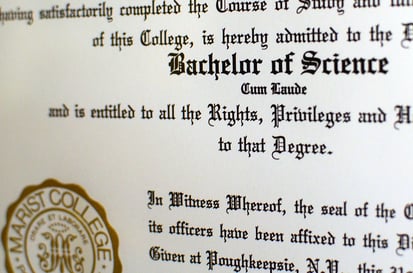
If you have great grades and high test scores, some of your prospective universities may invite you to enroll in their honors college. Generally speaking, honors colleges and honors programs at U.S. universities offer top-tier students rigorous academic programs, special scholarships, and better job prospects.
But of course, there’s more to an honors college or program than that! We’re going to introduce you to honors colleges and honors programs so you can decide whether enrolling in one is right for you. This article will:
- Answer the question, “What is an honors college?”
- Discuss what types of students might be a good fit for an honors college
- Explain the difference between an honors college vs honors program
- Take an in-depth look at real honors programs at two U.S. universities
- List five pros and cons for enrolling in an honors college
Are you ready? Let’s get started!
Feature Image: slgckgc /Flickr
What Is an Honors College?
What is an honors program in college? Now, don’t be misled by the name “honors college”—an honors college isn’t an independent university. Instead, an honors college is a program that exceptional high school students can apply to and enroll in while completing a traditional bachelor’s degree.
Put another way, an honors college one of a number of colleges on a university campus. Just like the college of arts and sciences or the business college, an honors college is another on-campus school that forms part of the university’s educational system.
While every honors college is different, many honors colleges offer enrolled students perks. Here are some unique opportunities that you can find at honors colleges and programs across the nation:
Courses with more rigorous and/or specialized curriculum that are exclusively open to honors college students
Smaller class sizes that can be conducted seminar-style, allowing students to interact more meaningfully
A smaller faculty-to-student ratio, giving students the opportunity to interact more frequently with professors and advisors
Housing and/or housing amenities that are reserved for honors students, giving honors students the opportunity to form a close knit community
Priority registration, giving honors students a wider range of course options and the opportunity to curate a semester schedule that suits their needs
If these benefits sound great to you, then you might enjoy the experience of enrolling in an honors college.

Graduating With Honors From an Honors College
Colleges want to reward students who graduate from their honors college, meaning that you’ll get a special distinction once you graduate. And that’s pretty great, especially since completing an honors degree takes a lot of hard work!
While you don’t have to be in an honors college to graduate with honors, some universities reserve extra special distinctions for honors college graduates. Students who successfully meet the requirements to graduate from their honors college will usually have the distinction on their diploma, which indicates they’ve received an honors distinction. Honors college graduates may also receive a special medal or regalia to wear at their university’s commencement ceremony to set them apart from their peers.
At most universities, there are three tiers of honors you can receive depending on your final cumulative GPA. The better your GPA, the higher your distinction. Here’s a general range of how the distinctions break down, though your school’s honors college may do things slightly differently:
Like we mentioned earlier, these distinctions are usually printed on your diploma as a sign of your hard work. For example, if you graduate with a 3.85 GPA with a degree in electrical engineering, your diploma may say you earned a “Bachelor’s of Science in Engineering, magna cum laude.”
Regardless of the tier, getting any version of cum laude on your diploma is a reward the hard work it takes to complete an honors program.

Who Should Enroll in an Honors College?
So, how do you know if you’d be a good fit for an honors college? Ultimately, it comes down to two things: your GPA and your ambition.
In order to get into an honors college, you have to be an excellent student. In other words, you’ll need to have a high GPA and great test scores to qualify for admission. Most honors programs have minimum score and GPA requirements that you must meet in order for your application to be considered. For example, the honors college at Indiana University requires students to have a 4.0 GPA and either a 33 on the ACT or a 1500 on the SAT in order to be admitted. That’s well above the national average !
Besides having excellent grades and test scores, students who are good candidates for acceptance to an honors college are typically involved in intellectually rigorous or creatively oriented activities during high school, both in and out of the classroom. Students who excel in honors colleges enjoy learning and like an intellectual challenge. Additionally, candidates should also embrace hard work: the classes you’ll take as an honors student are usually a lot tougher!
If you meet the academic requirements and are ready to be a focused, intellectually curious, hard working student, then you’re probably a good fit for a university honors college or honors program!

Honors Colleges vs Honors Programs: What’s the Difference?
You may hear the phrases “honors college” and “honors program” used interchangeably, but there are actually some significant differences between the two. So, what is an honors college vs an honors program?
The key difference between honors colleges and honors programs in the United States is that honors colleges function as discrete schools within the larger university system, and honors programs aren’t separated into individual colleges within the university. Put another way, an honors college is a separate school within a university, while honors programs aren’t.
Because honors colleges are stand-alone schools on a university campus, they tend to require more resources. Consequently, honors colleges are more commonly found at big, public universities. On these campuses, honors colleges typically function like the other colleges at big universities, complete with their own on-campus facilities, academic advisors, student scholarships, study abroad opportunities, and course offerings that are open to honors students only.
In contrast, honors programs can often be found at smaller colleges and universities. Smaller institutions may have fewer or no individual colleges within the larger university system. At these smaller schools, honors students will not be a part of a separate college within the university but will follow a special honors curriculum and/or complete extra assignments, like an honors capstone project or honors thesis, in order to graduate with distinction.
Having said that, both honors colleges and honors programs provide academically ambitious students with an enriching educational experience that can give graduates a head-start in their future careers.
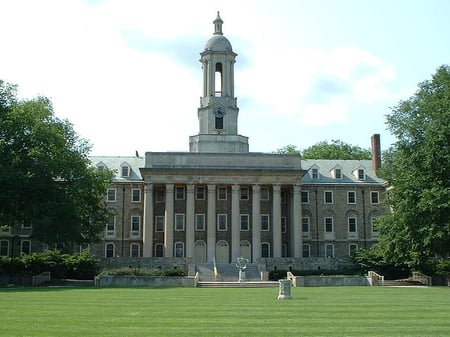
Penn State University's honors college takes the top spot on our list. ( George Chriss /Wikimedia)
In-Depth Guide to Honors Programs: Penn State Honors College and University of South Florida Honors College
Learning about two real honors programs can give you more insight into what it’s like to be part of an honors college.
To give you a real sense of what honors colleges and honors programs are like, we’re going to take an in depth look at two honors programs : the honors college at Pennsylvan ia State University and the honors program at the University of South Florida.
Schreyer Honors College, Pennsylvania State University
The Honors College at Penn State is called Schreyer Honors College , and like most honors colleges, it’s a separate school within the Penn State system.
Schreyer prides itself in offering a “best of both worlds” experience to its students. Honors students have access to the cutting edge resources of a big, top-tier research institution, but they have the small class sizes and one-on-one learning experiences characteristic of a small liberal arts college.
So if you’re a student who wants to be part of a community where you know your professors and classmates but you don’t want to miss out on a “big university” experience, then an honors college like Schreyer at Penn State can provide that for you.
The Admissions Process
In order to apply to Schreyer Honors College, you’ll need to complete the Penn State undergraduate application and then complete the separate Schreyer Honors College application .
There are several components to the Schreyer application . You’ll have to answer three essay questions and a handful of short answer questions, submit two letters of recommendation, and self-report your high school academic record.
You might notice that standardized test scores and high school transcripts aren’t included in the list of application components. That’s because unlike many honors colleges, Schreyer doesn’t take SAT or ACT scores into consideration as a part of its application process! Part of Schreyer’s philosophy is that test scores and high school GPA aren’t the best predictors of academic success . Instead, students have to explain their high school course load as part of their application.
Schreyer applicants who submit their application materials by November 1 are invited to an optional Admissions Interview with a Scholar alumnus. If you aren’t able to submit your application early it won’t negatively impact your application, but landing an interview gives you a chance to make a case for yourself in person. (If you want to know more about what a college interview is like, be sure to check out our article that demystifies the college interview process .)
The Honors College Experience
Now you know what to expect from the Schreyer application and admissions process, but what’s the student experience like?
Along with the excellent research opportunities and intimate classroom environments we mentioned earlier, Schreyer students also have unique opportunities to learn the soft skills they’ll need to be successful in college and beyond.
When you’re a Schreyer honors student, you have access to an on-campus community, various academic and student life programs, and career development opportunities that non-honors students don’t. In addition to providing on-campus housing for honors college students, Schreyer has several leadership opportunities for its honors scholars, including a student council, a residence hall Scholar Assistants (SAs) program, Orientation Mentors, and Scholar Ambassadors. The skills you learn in these programs will give you a huge leg up when you embark on your career after graduation.
Along with a phenomenal academic experience, these community activities give Schreyer students the chance to network with fellow honors students and honors college alumni ...which can translate to better career opportunities after graduation, too.
Graduation
To remain in good standing as a Schreyer Scholar, you’ll have to meet certain requirements as outlined by the college , including a minimum GPA and completion of honors courses and credits. Scholars are also required to complete an honors thesis in order to graduate from the honors college. Usually, honors theses require students to conduct independent research and present it to a committee of professors.
Honors students who complete the requirements for an honors distinction will graduate with honors and receive a Scholars Medal to wear at Penn State commencement as well as have honors conferred on their diploma . Schreyer also hosts a separate Honors College Medals Ceremony prior to commencement, during which the Scholars Medals are presented to graduating Scholars.
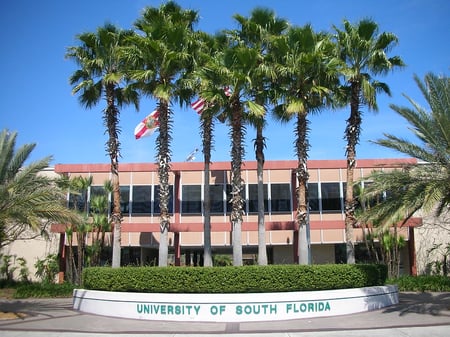
( Simon Kellogg /Flickr)
University of South Florida Honors College
Like Shreyer at Penn State, the Judy Genshaft Honors College is its own school on the USF campus.
The honors college at USF offers the rigorous academic experience of a top-tier research university with the close-knit community that smaller, private institutions are typically known for. That means you’ll have more demanding classes, smaller class sizes, one-on-one interaction with your professors, and unique opportunities only available to honors students.
The Admissions Process
To become an honors student at USF, prospective students must apply to the University of South Florida before applying to the Judy Genshaft Honors College . While all interested high school students are encouraged to apply, the honors college does take high school GPA and SAT/ACT scores into account . The Honors College has an automatic admission policy for students who meet the following criteria:
- Score 1400 or higher on the SAT, or score 31 or higher on the ACT
- Have a recalculated USF GPA of 4.0
The recalculated GPA portion of USF’s honors college admissions process takes your high school GPA and then adjusts for difficulty. To figure out your recalculated GPA, the honors college does the following :
- Adds one-half point for honors courses
- Adds one point for AP , IB, AICE , or Dual Enrollment courses
- Removes any non-academic courses (i.e. P.E., Band, etc.)
The university points out that most students’ recalculated GPAs are lower than their high school GPA . But don’t worry: while your recalculated GPA might not qualify you for automatic admission into the honors college, the admissions committee places more emphasis on the other aspects of your application than your recalculated grade point average.
In addition to evaluating applicants based on GPA and test scores , the honors college at USF evaluates applicants based on two other criteria: involvement in high school activities and a 500-750 word essay response. For the essay response, the honors college provides six essay prompts that address the three core honors college values. Applicants are encouraged to choose to respond to one essay prompt that speaks to them! (Be sure to check out this article for expert advice on how to write a killer admissions essay .)
There are many benefits for students in the Judy Genshaft Honors College . USF’s honors college offers small, discussion-based classes that give students the opportunity to interact closely with faculty and fellow honors students from different majors. This lets honors students receive lots of personalized attention to help them reach their academic and career goals, which is probably why USF honors grads have gone on to do amazing things, like become CEOs and work for NASA .
USF honors students are able to register for classes on the day registration opens, which means they get first pick of course choices every year. Honors students also have special academic advisors that help students plan class schedules, make decisions about their majors, and even search for internship opportunities. Another perk of being in the Judy Genshaft Honors College is that students are also eligible to live in a special Honors Living Learning Community (LLC) , which is on-campus housing option only available to honors students.
Additionally, the honors college offers a unique program called the Provost’s Scholars Program . This program helps students graduate in three years rather than four , and it provides students the chance to study abroad, learn leadership skills, and gain professional development. The Provost Scholars Program allows high-achieving students to save money on their education while simultaneously helping them jumpstart their future careers.
As is typical of honors college, the Judy Genshaft Honors College requires its students to complete a research track consisting of either an honors thesis or capstone project . The thesis track is recommended for students who want to go into research-based fields or academia, and the capstone project is for those interested in conducting research with their fellow honors college peers. Capstone projects happen in a classroom-style setting, and the topics vary from semester to semester.
Like Penn State’s honors graduates, USF honors grads also receive special recognition for their accomplishments on their diplomas and on graduation day. Judy Genshaft Honors College graduates are invited to attend a special graduation ceremony for all graduating honors students . Family and friends are invited to the ceremony, and each graduating honors student is recognized individually during the ceremony. At the university-wide commencement ceremony, Judy Genshaft Honors College graduates wear special honors college regalia to signify their successful completion of the honors program.

5 Pros and Cons for Enrolling in an Honors Program
There are a lot of perks to enrolling in an honors college, but before you decide that being an honors student is the best choice for your academic career, it might be helpful to weigh a few pros and cons that come with honors colleges. After all, participating in an honors program can be a pretty big time commitment!
Check out our list of five pros and cons for enrolling in an honors college below to help decide whether an honors program is the right choice for you.
Pro: You Can Get an Elite Education at an Affordable Price
Honors colleges are a more equitable alternative to elite colleges and universities. It’s no secret that most premier universities in the U.S. come with a hefty price tag —one that many hardworking families simply can’t afford to pay for.
One of the benefits of an honors college is that most provide funding opportunities for both incoming and current students. For example, the University of Utah’s honors college offers scholarships that are only available to honors students , and some of the awards are as high as $10,000. Even better: because there are fewer honors students, you have a better shot at actually winning a scholarship.
Additionally, enrolling in an honors college at a public school gives high achieving students the opportunity to receive an elite education they can actually afford. Honors colleges offer the kind of highly specialized, rigorous academics that are the hallmark of the most selective college s. That means that at some schools, you can get an Ivy-style education for a fraction of the price.
Pro: You’ll (Probably) Get to Register for Classes Early
One of the biggest recurring perks of being an honors student? A little thing called priority registration. Priority registration allows honors students to attend academic advising sessions to plan their semester schedules and register for classes before all non-honors students.
So, how does priority registration work out in the honors student’s favor? When enrollment periods open for different groups of students at colleges and universities—especially big universities—classes fill up fast. The later you enroll, the less likely you are to get into the courses you need to take, and the less likely you are to come out with a schedule of classes that you find appealing (7:30 a.m. class on Mondays, anyone?). When you get to register for classes before everyone else, you’re much more likely to get into the classes you want, at the times you want!
Pro: You’ll Be Around Other High-Achieving Students
A key feature of honors colleges and programs is that they offer courses—“honors courses”—that are exclusively available to honors students. These honors courses usually have limited enrollment so that the class sizes are small. This means that you’ll probably be seeing the same students over and over again in the classes you take. On top of that, many universities have special housing, classrooms, and study spaces reserved especially for honors students.
The honors college can form a close-knit community of students, since honors students spend so much time in the same spaces doing the same things . That can be a really good thing: not only will you be more connected to your honors college community, you’ll have the opportunity to make friends, too. Whether they become a consistent study partner or your BFF, your honors college peers can be one of the biggest pros of the honors college experience.

While there are some pretty big perks to being in an honors college, there are some downsides, too.
Con: Honors Students Do More Work
In general, honors college students are going to be doing more work than their non-honors schoolmates. In general, honors courses require more studying, more homework, and more writing.
For example, an honors history class may require you to read more than just a textbook. Your professor may give you academic articles, history books, or even a novel to complement what you’re learning in class. And you can expect for your tests and papers to be graded on a tougher rubric, too. That’s because your professors know that as an honors student, you’re the best of the best. It’s their job to push you to expand your skills...which can translate to a heavier workload.
Honors students also have to do extra work if they want to graduate with distinction. Both Penn State and USF require students to write a thesis or complete a capstone project. This involves (you guessed it!) more research and writing, much of which has to be done on your own time. That means you’ll have to fit the extra work in around your already busy schedule. So if you aren’t ready to take on a heavier workload—or if you’re not great at juggling multiple projects at once—an honors program may not be the best fit for you.
Con: The Perks Can Vary
We’ve mentioned several perks of being an honors college student, like priority registration, select student housing, smaller class sizes, and special on-campus facilities. But before you decide to apply to an honors college, it’s important to recognize that the nature of these perks will vary from school to school. Most often, the resources and opportunities available to honors college students depend on how well-funded the honors college or program is.
If you want to know exactly what you can expect your experience to be like as an honors student at a particular school, it’s important to ask a lot of questions about the program before you make any kind of commitment. One easy way to find out all the things you want to know about a specific honors college or program is to get connected with a current honors student at the university you’re interested in. Whether it’s through email, social media, or an in-person campus visit, talking with a student who knows the ropes of a university’s honors program can give you the perspective you’re looking for.

Next Steps
If you’ve decided that you want to be an honors student but your high school GPA isn’t high enough, it’s time to get to work. Start by reading through this guide to raising your GPA fas t, then check out this guide to getting 4.0s or higher in your classes .
Many honors colleges and programs look at your weighted GPA when determining whether you meet the minimum admission requirements. But what is a weighted GPA? Learn about the difference between weighted GPAs and unweighted GPAs , then make sure you’re calculating your weighted GPA accurately .
Another good way to get admitted into an honors college is to take advanced courses in high school. (The Penn State honors college we talked about is actually more interested in your high school course load than your GPA and test scores!) Start by learning more about what AP classes and IB classes are, then check out this guide to determining which advanced classes will work best for you .

Ashley Sufflé Robinson has a Ph.D. in 19th Century English Literature. As a content writer for PrepScholar, Ashley is passionate about giving college-bound students the in-depth information they need to get into the school of their dreams.
Student and Parent Forum
Our new student and parent forum, at ExpertHub.PrepScholar.com , allow you to interact with your peers and the PrepScholar staff. See how other students and parents are navigating high school, college, and the college admissions process. Ask questions; get answers.

Ask a Question Below
Have any questions about this article or other topics? Ask below and we'll reply!
Improve With Our Famous Guides
- For All Students
The 5 Strategies You Must Be Using to Improve 160+ SAT Points
How to Get a Perfect 1600, by a Perfect Scorer
Series: How to Get 800 on Each SAT Section:
Score 800 on SAT Math
Score 800 on SAT Reading
Score 800 on SAT Writing
Series: How to Get to 600 on Each SAT Section:
Score 600 on SAT Math
Score 600 on SAT Reading
Score 600 on SAT Writing
Free Complete Official SAT Practice Tests
What SAT Target Score Should You Be Aiming For?
15 Strategies to Improve Your SAT Essay
The 5 Strategies You Must Be Using to Improve 4+ ACT Points
How to Get a Perfect 36 ACT, by a Perfect Scorer
Series: How to Get 36 on Each ACT Section:
36 on ACT English
36 on ACT Math
36 on ACT Reading
36 on ACT Science
Series: How to Get to 24 on Each ACT Section:
24 on ACT English
24 on ACT Math
24 on ACT Reading
24 on ACT Science
What ACT target score should you be aiming for?
ACT Vocabulary You Must Know
ACT Writing: 15 Tips to Raise Your Essay Score
How to Get Into Harvard and the Ivy League
How to Get a Perfect 4.0 GPA
How to Write an Amazing College Essay
What Exactly Are Colleges Looking For?
Is the ACT easier than the SAT? A Comprehensive Guide
Should you retake your SAT or ACT?
When should you take the SAT or ACT?
Stay Informed
Get the latest articles and test prep tips!
Looking for Graduate School Test Prep?
Check out our top-rated graduate blogs here:
GRE Online Prep Blog
GMAT Online Prep Blog
TOEFL Online Prep Blog
Holly R. "I am absolutely overjoyed and cannot thank you enough for helping me!”
College Reality Check
Top Benefits of Being a Student-Athlete in College
“Hey, mom! My coach just got me a new pair of running shoes and an appointment for a massage right before we leave for Nationals. Actually, he got everyone who qualified for Nationals new shoes.”
This wasn’t the first time my son had called to tell me about the perks of being on the Westmont College track team. In fact, I could fill a book with all the advantages that come with being a student-athlete in college.
The benefits of being a student-athlete in college include a team of lifelong friends, the development of a strong work ethic and other character values, a support system of coaches and mentors, and access to financial assistance, academic resources, and athletic gear, products, and programs.
Of course, some schools have more funding and can provide larger amounts of gear and apparel while other colleges excel at fostering relationships and team building. Sometimes it’s the size of the school or the college’s division within the NCAA that affects the kind of benefits that various universities provide.
Often, it’s the coach and the way in which they relate to college kids and encourage and inspire them that supplies the most beneficial aspects of being a student-athlete.
Six Benefits of Being a Student-Athlete

Development of Work Ethics and Leadership Skills
Since playing a sport in college is like having a full-time job on top of going to school, student-athletes are forced to develop a strong work ethic as they learn to manage their classes and their athletic obligations.
This makes them more desirable in the workforce where employers seek out young adults who can balance rigorous academics alongside extensive practicing and competing.
Leadership skills, discipline, and teamwork are additional attractive and employable proficiencies that student-athletes develop while being a part of a team.
Learning to compete as a team and developing a mindset that puts team before self are qualities that are most often fostered within the confines of college athletics.
Lifelong Friendships with Teammates
College is a time and place for the cultivation of friendships that last forever. And college sports teams take bonding to the next level.
Not only are student-athletes placed in an instant peer group, which some might argue allows you to skip that awkward initial stage of not knowing anyone and having to stumble along looking for new friends, but they are also set up to bond immediately through team-building activities, competitions, and travel.
Student-athletes are surrounded by teammates for much of their non-class time, and most take advantage of being with peers who share their passion for [insert sport here] and grow in friendship and respect due to their commonalities.
Athletes have highs and lows, victories and losses, good times and bad, and it’s those shared experiences that often create and strengthen lifelong bonds between teammates.
Academic Resources and Privileges
It’s in an institution’s best interest to help its students, including its student-athletes, to succeed, and coaches and sports programs are especially concerned about providing every opportunity for their athletes to thrive.
So, it’s very common for universities to have special tutoring and study sessions for their athletes and prioritize their needs over those of regular students.
In addition to receiving first pick of classes, student-athletes often get top-notch advisors and access to state-of-the-art technology to ensure they accomplish all that’s needed to be successful in their studies and remain in their sports program.
Smaller schools may have few academic resources, but since they are small, the coaches are typically in close contact with professors and made aware when their student-athlete’s grades are slipping.
Better communication and one-on-one meetings with coaches and advisors are often more available and convenient at smaller universities.
Student-athletes have a higher graduation rate than non-athletes, and over 80% of Division 1 athletes receive bachelor’s degrees. The NCAA has academic support systems in place to ensure its athletes excel in the classroom as much as the court, field, or track.

Access to More Financial Assistance
Regular students can apply for merit scholarships at private schools and some public schools while student-athletes have access to both academic and athletic scholarships .
Since the majority of NCAA athletes that receive scholarships get partial athletic aid, it’s very common for them to get academic scholarships as well.
As a matter of fact, coaches love when their athletes qualify for merit scholarships so they require a smaller athletic award to complete the financial aid needed for that individual, saving money in their athletic budget .
The only time student-athletes would not benefit from the opportunity of athletic aid is at an NCAA Division 3 school. D3 colleges are not permitted to provide athletic awards.
But if you’re recruited by an NCAA D1 university, you may be eligible for a full-ride scholarship. D2 and NAIA colleges give out partial athletic scholarships. Of course, athletic awards are only available to student-athletes.
Health and Wellness Programs and Gear
Coaches want their athletes to succeed, so it’s not uncommon for them to provide regular workshops, private training, sports gear, and body treatments, including ice baths and massages, to keep them in good shape.
Some colleges even provide meals and snacks free of charge to ensure their athletes are getting the calories they need to perform well.
Injuries are taken seriously, and coaches become advocates for their athletes, making necessary phone calls and getting appointments that might not be readily available to non-athletes.
The NCAA provides medical insurance and trainings on mental health, sexual assault prevention, concussions, etc.

Specialized Training and Collegiate Competition
This may seem obvious, but for an athlete, the chance to train and compete at a high level under expert instruction on a regular basis is a dream come true and, perhaps, the biggest benefit of all.
In fact, one of the hardest times for the high school athlete that doesn’t go on to play in college is the last game or meet of their high school season when they realize it’s the final time they will play in an organized school event.
For many, college sports allow athletes to continue to excel at what they love to do most.
Disadvantages of Being a Student-Athlete
As stated above, being a student-athlete is like having a full-time job on top of taking a full load of classes.
So, naturally, the primary disadvantage of being a student-athlete usually comes down to not having enough time, including not enough time to study, to hang out with friends, to have a job, or to indulge in other interests and hobbies.
If your closest people are not on your sports team and you find yourself suffering from FOMO (fear of missing out) all the time, athletics in college might not be for you. If you’re too tired to focus and study or you’re using your free time to play rather than study, you may need to reassess the value of being on a sports team in college.
And if you have not received enough financial aid to cover the costs of tuition, room and board, and books and supplies without having a job, being a student-athlete may be too much for you to carry.
It’s important to sit down with someone you trust and weigh the pros and cons of being a student athlete. Make a list of things you’d be willing to sacrifice and a list of those things you could not give up.
If the latter outweighs the former, you may need to reevaluate your plan to play sports in college.
Disadvantages to being a student-athlete include the following.
- Student-athletes are at a higher risk of injury.
- Student-athletes often get less sleep due to an abundance of responsibilities.
- Student-athletes can feel like they have less freedom to do what they want.
- Student-athletes may struggle academically.
- Student-athletes occasionally miss out on social activities.
Do College Student-Athletes Do Better?
Whether or not student-athletes thrive during and after college depends on the individual, but according to a new Gallup study , the vast majority of student-athletes fare better than their non-athlete counterparts in almost every aspect of life.
Gallup examined student surveys that covered relationships, health, jobs, and community involvement, all showing student-athletes to have more favorable outcomes than non-athletes in their personal, academic, and professional lives.
Why do student-athletes appear to do so much better than their counterparts? The striking difference, researchers found, is due to “built-in support systems” from which student-athletes get to benefit while in college.
Those advantages above, including mentorship from coaches, close relationships with teammates, academic support, and access to financial help, all serve not only to benefit the student-athletes while they are in college, but also to set them on the path to success long after.
Why Is It Important to Be a Student-Athlete?
Most college athletic teams start with a team-building retreat to create team cohesion, enjoy time together, and recover from intense pre-season conditioning. And as a team, athletes set their sights high for the season, planning to bring home titles, break records, and win national championships.
Inherent in being a student-athlete is setting the bar high for yourself. Rather than settling for good enough, teammates set goals and push each other to do their best. Working hard while doing everything to the best of your ability becomes the default with which a student-athlete approaches life.
Athletes naturally want to win and break personal records. But in college sports, lessons are learned that shape who these kids become as students and, later after college, as employees and people affecting change in the world.
Being a part of a team means applauding the success of others, being willing to sacrifice for the betterment of the team, and being passionate in a way that motivates others. These learned traits serve student-athletes well whatever career they pursue in life since most require their employees to work within a team of some sort.

Is It Worth It to Be a College Athlete?
Once again, the best way to determine if being a college athlete is worth the cost is weighing the pros against the cons. Do the benefits outweigh the sacrifices? Consider the following questions:
- Are you willing to spend more time in the weight room while your non-athlete friends go to the beach, the bowling alley, or the movies?
- Will you be able to keep up in your chemistry course when you have to travel and miss classes for competitions?
- Will your teammates become your closest pals or will you try to juggle two sets of friends?
- Will you feel like you’re missing out on something when you’re not with your non-athlete friends?
- How valuable is the opportunity to undergo rigorous training, coaching, and competition to you?
- If you can’t have a job while in season, is not making money during that time worth it?
- What else will you personally be giving up to be a college athlete?
It’s also important to consider your personality.
Do you enjoy an intense level of working out? Do you do best when you have consistent structure and discipline in your life? Do you look forward to practices and competition?
If you don’t, you may want to consider club or intramural sports, a popular, less-intense athletic option.
How College Sports Affect Education
It’s no new discovery that exercise enhances intellectual performance and cerebral faculties.
In fact, it’s been long believed that physical activity provides a variety of mental and physical benefits. So, it’s little surprise that studies show a link between college sports and getting good grades.
In the college world, athletes have occasionally gotten a bad rap for less than stellar grades in some sports, like football and basketball. These students may find it difficult to stay in shape, manage a full schedule of classes, attend practices, write papers, travel to competitions, and pass exams.
However, the vast majority of high-level athletes have found that the required organization to balance sports and studies pushes them to be more successful in both areas.
The life of a student-athlete is not without challenges, but for many, the benefits are unparalleled and outnumber the drawbacks. Indeed, there are countless ways that the benefits of college athletics serve to transform teenagers into responsible adults equipped to make an impact in the world.

Tasha is the owner and educational consultant at TVH College Counseling in northern CA. She and her husband have a son in high school and two college kids at Westmont College in Santa Barbara. Tasha has an MAT in Linguistics from Georgetown University and a Certification in College Counseling from UCSD.
Similar Posts

How to Respond to a College Coach Email
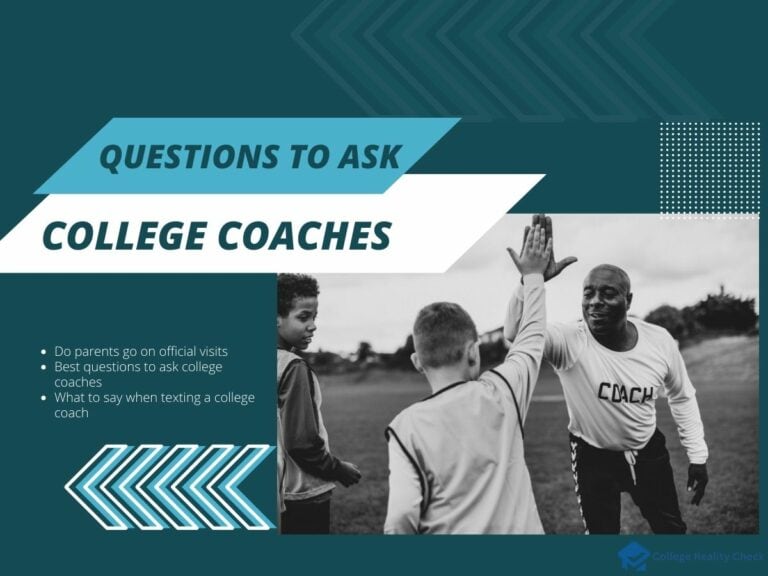
6 Vital Questions To Ask College Coaches: Parent’s Guide

Combining Athletic Scholarships and Financial Aid: Is It Possible?

How to Get a Soccer Scholarship (Division I and II)

How to Email a College Track Coach

Average Track and Field Scholarship Amounts
Important Addresses

Harvard College
University Hall Cambridge, MA 02138
Harvard College Admissions Office and Griffin Financial Aid Office
86 Brattle Street Cambridge, MA 02138
Social Links
If you are located in the European Union, Iceland, Liechtenstein or Norway (the “European Economic Area”), please click here for additional information about ways that certain Harvard University Schools, Centers, units and controlled entities, including this one, may collect, use, and share information about you.
- Application Tips
- Navigating Campus
- Preparing for College
- How to Complete the FAFSA
- What to Expect After You Apply
- View All Guides
- Parents & Families
- School Counselors
- Información en Español
- Undergraduate Viewbook
- View All Resources
Search and Useful Links
Search the site, search suggestions, 7 reasons why harvard.
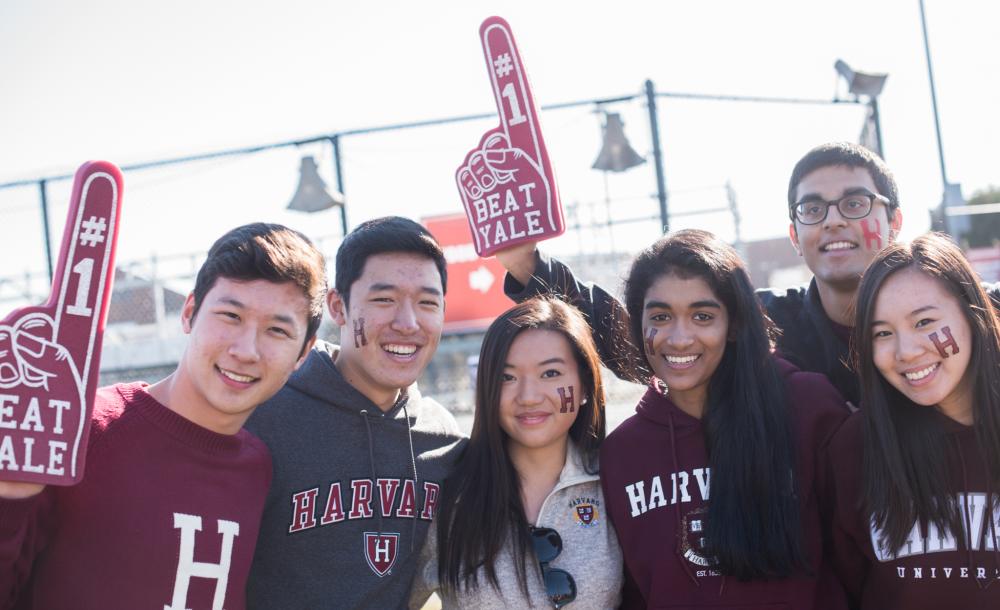
The admissions process is over, and if you got accepted, congratulations!
If you weren’t accepted, even Harvard makes mistakes. But to those who’re starting to look at where to go to college, here’s why Harvard’s a great choice .
Choosing between colleges can be tougher than Liam Neeson in Taken. Like choosing between candy bars, each college can seem like the same but each seems pretty cool. I can’t pretend like I had a tough college decision making process. I never thought I’d get into Harvard, but when I did (re: “even Harvard makes mistakes”), it was a no-brainer, like Patrick Star.
But, if I had to make a decision between colleges, I would choose Harvard for these reasons:
Ability to do Whatever
The “ability to do whatever” doesn’t mean that you can like rob a bank. That’s highly illegal. But what that does mean is that because Harvard offers such a breadth of academic and extracurricular opportunities, you will be able to immerse yourself in whatever interests you. Also, if you were like me and are super undecided about what you want to do and study, Harvard’s pretty good at a lot of stuff, so you’re pretty much guaranteed to be taught by the best people in whatever you end up choosing to study. Even if you wanted to study something really obscure like medieval Icelandic witchcraft, there’s probably a professor who’s super interested in that (in this case, his name is Professor Mitchell). Harvard is a liberal arts college , so you won’t need to decide what you want to study for a little bit, and you’ll be exposed to a bunch of different fields of study. Choosing a concentration is tough, but there are so many good choices that you can't go wrong.
With extracurricular activities , Harvard has a ridiculous amount of clubs and organizations. Many of these are really involved in their field, like the Crimson with journalism, the Institute of Politics with government, and the Lampoon with comedy, for example. Many of these are pretty much just for fun, like the Arnold Schwarzenegger Appreciation Club. Or you can make your own club, and Harvard will give you money to do that.
So, at Harvard, you can forge whatever path you want for yourself.
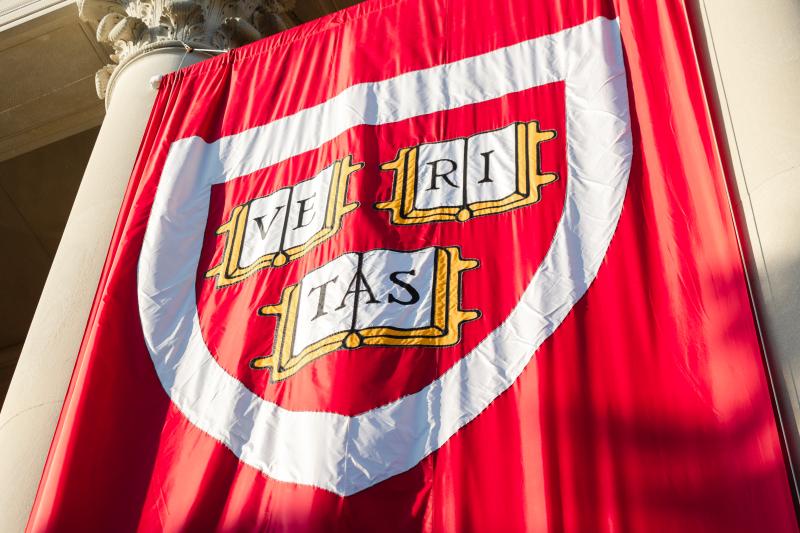
- Financial Aid
Harvard offers a very generous financial program , and the financial aid officers here will make sure that finances will not be the reason you would not choose Harvard College. A Harvard education can cost less than a piece of Bazooka bubble gum. Harvard, for most families, is cheaper than attending their state’s college or university. That’s huge. One, because that means that Harvard’s actually doable; two, because that means you can graduate debt-free; and also three, because that means that the student body can be diverse and filled with the best people possible.
So, Harvard’s not filled with a bunch of people named John Washington Harvard Rockefeller IV, contrary to popular belief, and a lot of that is due to the financial aid program .
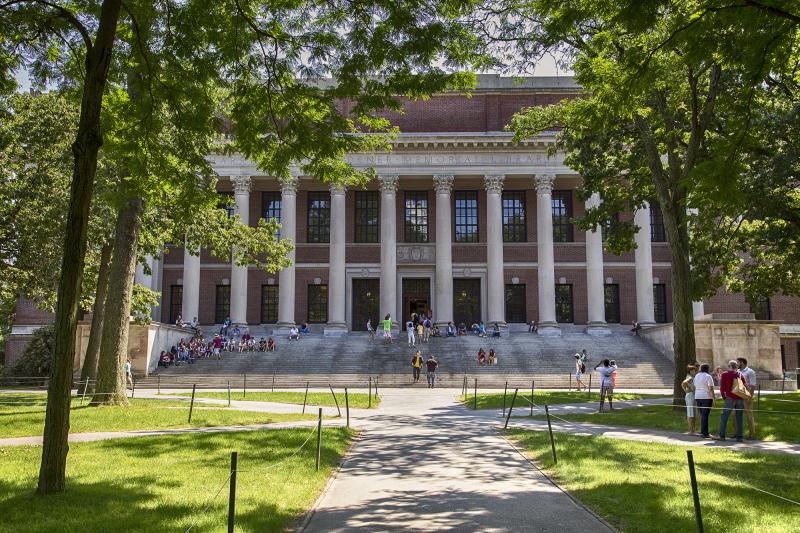
Harvard has a ridiculous amount of resources. To start with, the Harvard library system is the largest private library system in the world with 17 million volumes and 55 miles of shelving. But while you can’t possibly read all 17 million volumes in Harvard’s collection, you know that you’ll never need to go anywhere else to get the resources you need to be successful.
Beyond libraries, Harvard has a bunch of money to give out to help you do research or study abroad or both. About 70% of Harvard students will end up having some sort of substantial international experience, whether that’s studying abroad or doing an internship in a different country. One of my friends right now is abroad in the Caribbean studying the history of rum on Harvard’s dime. To me, that just sounds like a free vacation. And there’s also the Office of Career Services which you can go to if you need a job term-time or over the summer.
When you come onto campus, it can feel intimidating. It’s like going to Times Square for the first time. The history and tradition of this place can be overwhelming. But, eventually, this becomes your home Harvard’s the oldest college in America, founded in 1636. That’s, believe it or not, older than your grandpa, and if it’s not, your grandpa could be a wizard. Harvard has been around the block, and that comes with it a lot of cool traditions, a lot of history, and a crazy extensive alumni network. From Harvard-Yale to Housing Day, Harvard’s traditions are sometimes bizarre Once you graduate from here, your Harvard experience doesn’t end. Alums always want to help you out. When you come here, you become part of the Harvard family with cool people like Bill Gates and Elle Woods.
Harvard has the best of all worlds in my opinion of being in a city, being in a college town, and being its own college. Harvard is right outside of Boston, yet it has its own full out campus. And campus is pretty sweet. Boston and Cambridge are both really young places (the average age in Boston drops 10 years every move-in day in the fall), and there’s a ton of stuff to do for college students. Boston has character. Yet, there’s also always something happening on campus. You never feel the need to leave into Boston, but there’s always that option. The T is super easy. We’re on the Red Line, and in 15 minutes, you can be on Boston Common.
In regards to weather, most of the time you’re here, it’s awesome fall weather or it’s really hit-or-miss spring weather. In January and February, though, it does snow. I personally love snow, but if you don’t like it, just think of it as angels’ dandruff. If that’s also unappealing, realize that you’re only really here for a couple of months where it could snow. And if it snows, all you have to do is put your boots on and walk. You don’t have to shovel it or drive in it or anything.
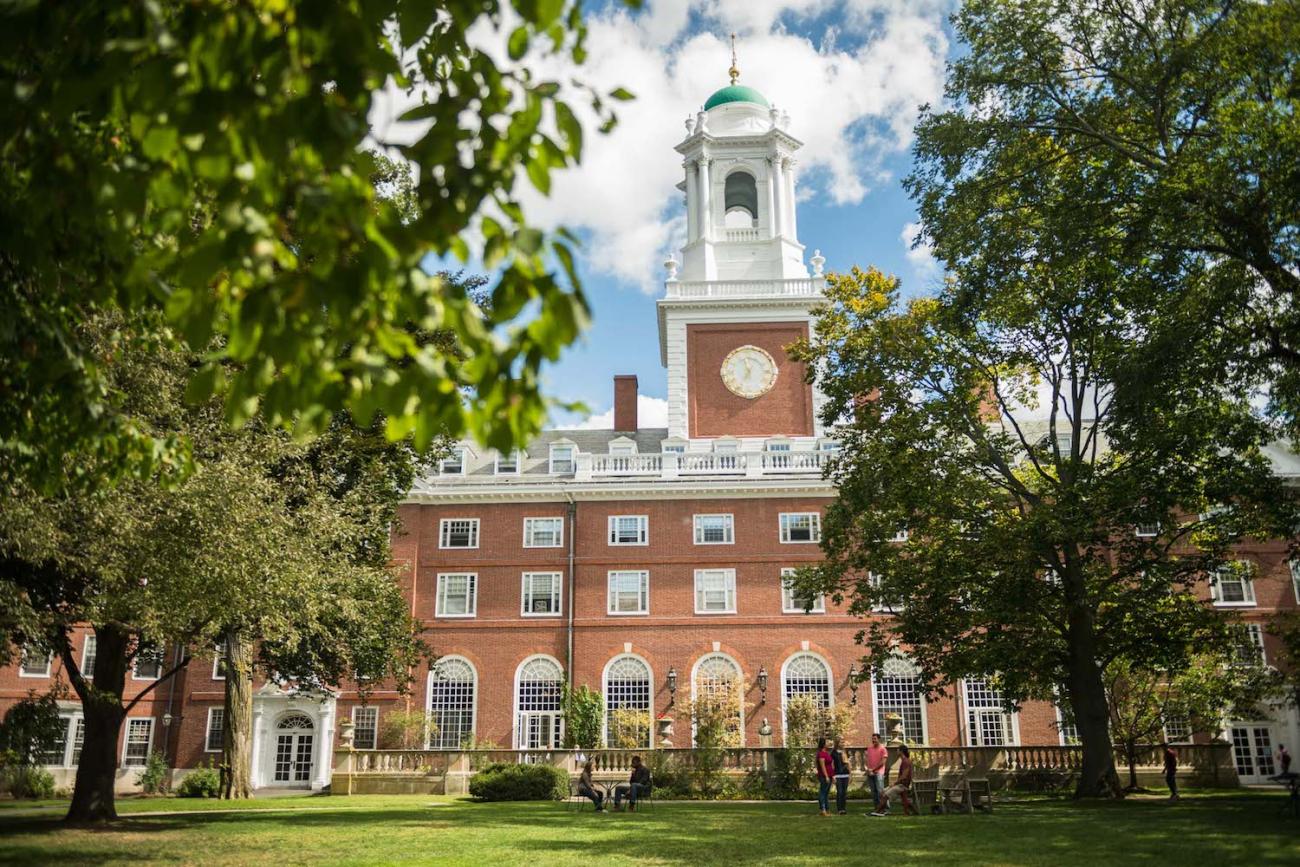
Housing here is pretty sweet. 98% of students live on campus all four years, which is different than most schools. Everyone’s always around on campus, which makes it that there’s always something to do. Freshman year, you live on Harvard Yard, and then at the end of your freshman year, you and up to 7 of your friends get placed into one of 12 upperclassmen houses. Each of the houses has their own little quirks and their own dining halls, gyms, libraries, practice rooms, and all that jazz. Your house is the community you get attached to, and even though it’s completely arbitrary as to what house you get placed in, everyone always develops a bunch of house pride. So, we’re completely spoiled with the housing here, but hey, I’ll take it.
This is super corny. But before, I thought that Harvard students were a bunch of nerds, and they are! I spent 30 minutes yesterday in a Wikihole reading about different castles. But at the same time, while Harvard students are similar in that they’re generally pretty driven, they’re incredibly diverse . So many people are doing so many different things, which is pretty cool, so you end up learning a ton from each other. I probably learn more from just sitting in the dining hall talking to people than I do in my classes. That’s not to say I don’t learn anything in my classes, but it just means the people here are pretty cool. And also, the people here are also like normal college students. We’re not robots but I guess I can’t be certain.
People are down to earth and like to have fun, and I’ve met some of my best friends here that I’ll have for the rest of my life.
In sum, I’m graduating in three more days, and I couldn’t be more upset to leave. I love this place, and I think it’s a place you could fall in love with too!
- Residential Life
- Student Activities
- Student Life
Dan Class of Alumni

Student Voices
How i chose to study abroad.
Rafid Class of '25

WHY HARVARD
Evelyn Class of '22 Alumni
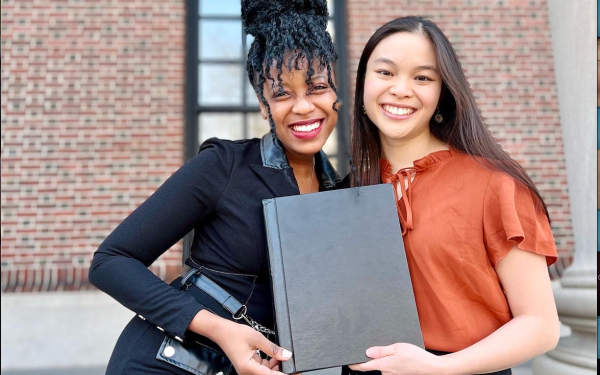
Bringing Harvard Home: Reflections on a Remote Senior Fall
Allison Class of '21 Alumni


- Money Matters
The Perks Of Being A College Student
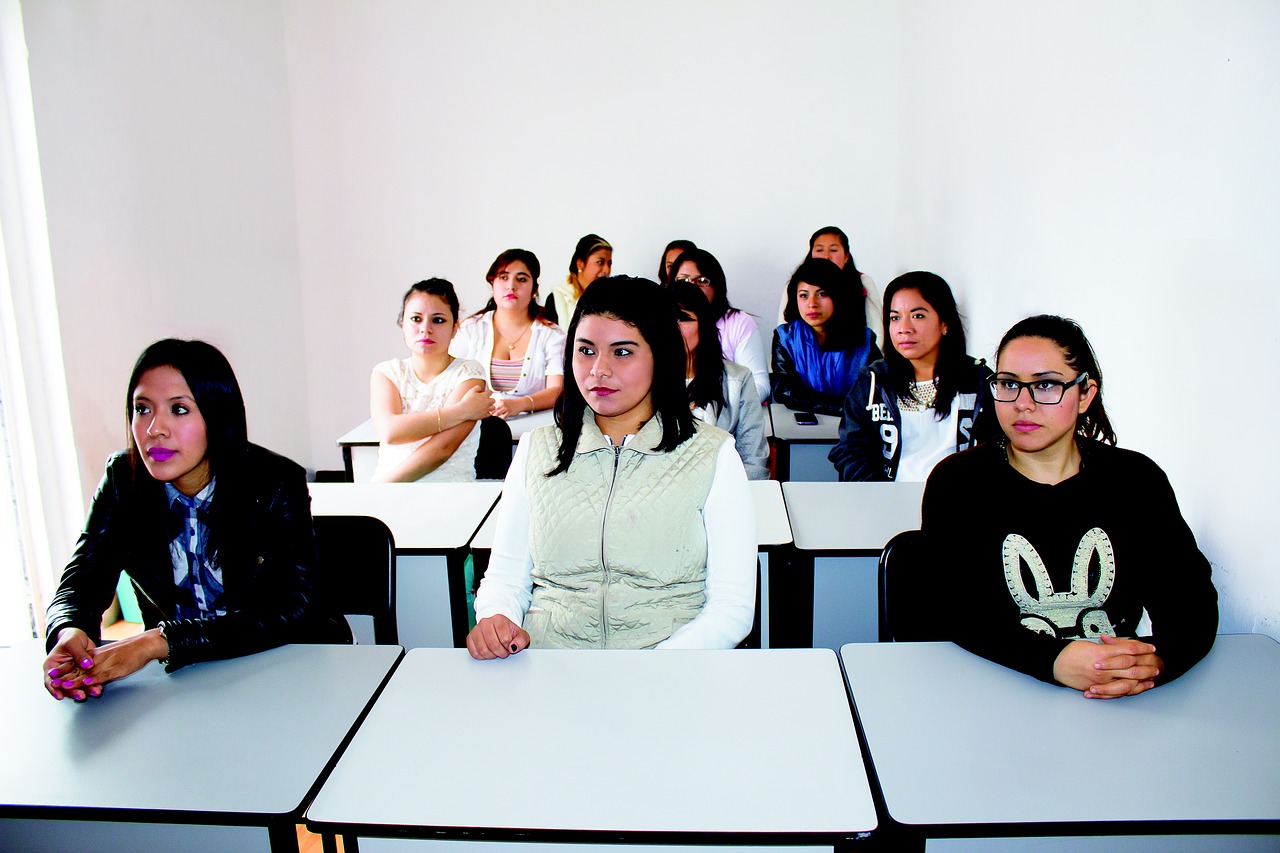
College life is one of those things that are hard to forget; even if 20 years have passed since you graduated. In the same vein, being a college student is quite an experience as well. College is where you transition from being a teenager to becoming an adult with responsibilities and duties. With that being said, it is also an incredibly fun time for everyone during which they should learn things about themselves and find out what they’re passionate about. However, having fun can be quite confusing when you aren’t even aware of the perks that are available to most college students. Well do not worry, we’ve listed the best perks available to college students here so you can learn about them and take advantage of them yourselves. Some of the best perks available to college students include:
- Cheap Food On Campus: Every college will provide their own canteen at which students can purchase decent food at cheap prices. But the real good deals start to come when other restaurants that aren’t established by the college management start to open up in your college. Chances are that they’ll price their items to appeal to college students. The only occasion where special prices wouldn’t be offered to students would be in the case of a large fast-food chain or restaurant chain like KFC or McDonald’s setting up an on-campus outlet. Moreover, try and explore areas around the college where most of the attending students usually stay. You will definitely find some places with great and affordable food.
2. Campus Library: Many people usually assume that the libraries available in their college will only offer educational books and wouldn’t have anything interesting in general. Well, we can’t say for sure that this isn’t the case but we do recommend that you take a glance at your college library. You may find some interesting magazines, newspapers and if you’re really lucky, your college library may have even had a separate section for fiction and young adult books. At the very least, a campus library is a place where you can sit and rest if its a hot day.
3. College Events And Parties: Every college will constantly hold events to get their students to participate and exhibit their skills. Though we also can’t say that all of these events will be fun, we can definitely say that some of them will be. Look out for cultural events, exhibitions and other things that you’re interested in. At the very least, you can always meet new people and make friends at these events. The same thing goes for college parties. Try to find out what parties are going on and attend the ones you feel are fun. You may ask, how is this a perk? Well, think of it this way; you wouldn’t be able to go to a college party if you weren’t a college student right?
4. Opportunities And Awards: As a college student, you will also receive the opportunity to participate in various events yourself to showcase your skills. Participating in events and receiving awards for said events will help you once your course is over when you are attempting to establish your career. Furthermore, you will also have the opportunity to interview with companies visiting your college for placement purposes. Of course, these opportunities are dependent on you and your passion for whatever course you’ve taken but we do recommend that you utilize such opportunities during the course of your college life.
5. Your Teachers And Friends: The biggest perk of them all. Being a college student allows you to get to know like-minded people with whom you may form important relationships that can last for years and decades even. Take the time to get to know the person sitting next to you, or your hostel roommate, or even that one girl or guy you think is cute. Eventually, you’ll make connections and relationships that you will carry with yourself till the end of your time in this world. The same goes for teachers, some of them will be important mentors that will inspire you to follow your dreams. All of these people and experiences will play a big role in your lives and will help in shaping up your personality for the years to come.
College may be an important time in all of our lives, but the most important part of attending college is to enjoy your time while you’re there. Because trust us, it gets a lot harder after college.
We hope today’s article entertained you. Thanks for reading!
Are you a fresher in need of some money? Check to see whether we cater to your college here : StuCred App
Tags-The Perks Of Being A College Student, College student benefits, free for college students, student advantages, benefits of going to college
Recent Posts

- A Comprehensive Guide to Pocket Money Loans for Students in India with StuCred November 24, 2023
- Quick Cash: Instant Loan Apps for Students in India November 21, 2023
Subscribe and follow

StuCred provides interest-free cash of up to RS 15,000 in just 60 seconds anytime anywhere.

- Awareness (77)
- Awareness (31)
- Inspiration (4)
- Money Matters (18)
- StuLife (62)
- StuTips (93)
Stucred Links
- How it Works
- Is Your College On StuCred?
- Careers at Stucred
- Stucred Empowering community by easy loan app for students
- Unlocking Financial Freedom: A Comprehensive Guide to Money Loans for Students
- Unlock Your Financial Freedom: Instant Loans Without Documents for Students
- A Comprehensive Guide to Pocket Money Loans for Students in India with StuCred
- Quick Cash: Instant Loan Apps for Students in India
Download StuCred
10 College Student Benefits You Didn’t Know You Had
- by Daniel Friedman
- 6 minute read

Ever wondered what perks you have as a college student? Here are 10 college student benefits you didn’t know you had!
Before we start, you should note that some colleges and universities offer different benefits. You might not have access to 1 or 2 of the offers that are going to be mentioned.
Hopefully you learn something new that you can take with you into college in order to reap all those benefits!
Let’s get started…
A lot of people understand that college students are broke. That’s why there are a few college student benefits to getting free things around campus.
Here’s what college students can get for free:
- Online Subscriptions
- Club Memberships
- Mental Health Counseling
- News Sites Access
- Legal Counsel
- Free Bus Transport
- Safe Taxi Services (in the case of being intoxicated)
- Microsoft Office 365
- Bank Accounts (at some banks)
- JetBrains (free coding site)
- Library and Computer Lab Access
Keep in mind, a lot of these perks are being paid by your tuition, but they are technically free while you’re on campus or have a student ID.
To check for free food, search online for “food pantry” in your college town and see if they host any weekly food giveaways. It should save you on some grocery expenses!
Student Discounts
Student discounts should be milked until stores rip your student ID out of your hand!
You usually just need your student email for online discounts and a student ID for in-store discounts.
Here are a few companies that offer student discounts:
- Amazon (Prime Membership)
- Banana Republic
- Chick-Fil-A
- Allstate
- Spotify
There are thousands of companies that offer some form of discount. All you have to do is… ask!
Never be afraid to ask (or look up) if a store offers a deal for being a college student. The only bad thing that can happen is you pay the same price you were already going to pay!
Related Post: 10 College Dorm Essentials Every Student Needs
Groups and communities.
While you’re in college, you’ll be surrounded by thousands of clubs, communities, groups, and more!
Take advantage of these by joining groups that you’re interested in. Not only will it help you with networking, but it’s also a great pass time and way to make new friends.
You’ll find most of these clubs just by walking around campus. You should also check out Facebook groups for extra opportunities outside of your campus.
If there’s a club that you’re looking for, but can’t seem to find… start your own! I bet there are a bunch of other people in your same position.
Hobbies are important during a time of constant pressure from studying all the time. Make sure you find time to do the things you enjoy (or at least search for them).
Making Friends
Making friends is the key to networking, having fun in college, and building lifelong relationships with people!
Easier said than done, I know. There’s plenty of ways to go about doing this, but it starts with you .
Keep in mind that everyone else is probably in the same boat as you. Everyone wants to make friends, but might be too scared or simply don’t know how.
If you’re already going to college with a friend, use each other as a confidence booster to meet even more people.
Challenge yourself to make at least 1 new friend in every class you’re in. This can also help when it comes to study time or completing homework assignments.
Maybe social anxiety has taken over. Regardless, friends are easiest made by talking over things you share in common.
If there’s a club that you can join and talk for hours about, chances are that there’s others that can talk for hours about it as well. From there, focus on building a foundation with just a few friends.
Related Post: How to Make More Friends
Grants for funding businesses.
While this may not be for everyone, some colleges offer grants to those determined students who need help funding a business idea .
It is most commonly found in entrepreneurship, but these grants are usually available in most fields (such as STEM)!
If you ever have a business idea that is ready for growth, but needs funding, be sure to search through your college’s resources for grants to pay for it.
These funds get used every year and are only available for college students who want to get their creative idea off the ground.
Professor & Student Relationships
One of the best college student benefits is access to brilliant professors.
Having a professor by your side can give you many advantages. Try getting close with professors that you respect . Maybe you like their teaching style, or have a passion for what they teach.
Professors are (usually) there for students to ask questions, give them advice, and expand your mind.
I had a professor who would offer me free coffee in the morning just because we were friends. Believe me, I was no teacher’s pet either. Some connections just happen naturally when you’re engaged in a subject and want to learn more.
I know people who have received job opportunities (yes, a job!) from a professor who needs research help and other small tasks. Better yet, a professor can also write excellent recommendation letters for job applications which you’ll be needing very soon!
Related Post: 10 Money Saving Tips for College Students
Study abroad.
Studying abroad is a huge perk of being a college student! Here’s why…
You can study the same things you’re already studying in a completely different country. The best part is… it’s usually around the same price as tuition !
What better way is there to explore the rest of the world while continuing on with your education? It doesn’t get better than that!
Don’t miss out on the incredible opportunity to travel to amazing countries, explore new cultures, and make new friends while you’re still in college.
Plus, the professors when studying abroad are usually much more chill about the amount of learning you do. It’s like free credits for doing less.
Explore Creative Hobbies
Most colleges and universities offer you access to try out creative hobbies for cheap (when they would otherwise be expensive).
Sometimes the hobby is offered for completely free as well.
Here are a few creative departments that offer cheap/free hobbies in college :
- Woodworking
- Photography
- Screen Printing
- Glass Blowing
Most of these creative hobbies would cost you a fortune to get started with. Plus, you don’t even know if you like them yet!
This is a great opportunity for you to relax and enjoy some quality free time, learning a new skill and eventually find a new hobby.
Related Post: 15 Things I Wish I Knew Before Starting College
Internship & mentorship opportunities.
The greatest college student benefits are the ones that offer you a bright future, such as internships and mentorships.
Most of them are offered only to college students, so you’re already in a smaller percentage of prospects to be hired!
You’ll have a lot more time to explore different career paths and try out new things because you’re in college. You would be going straight into the workforce without a real idea of what you enjoy otherwise.
Use resources like LinkedIn , Handshake , your college’s career center, or your major’s newsletter to find internships and mentorships!
These opportunities will likely only stick around while you’re still enrolled in your university, so take advantage of them early.
Up until now, you’ve most likely been living under someone else’s roof, following someone else’s orders, and having to go to classes that were assigned to you.
That’s not how it works in college. You’re on your own pal, but that’s a good thing!
Your independence will give you a chance to work on yourself, explore new things, and figure out who you truly are .
You’ll now have the freedom to create your own schedule, sleep when you want (most of the time), and take care of your own responsibilities.
Setting yourself up for the real world never hurts. Learn from your newly found independence and take advantage of the college student benefits that were given to you!
Hopefully you’ve learned something new that you can take with you into your next semester. If you’re a freshman… good luck on your first year!
If you have any comment, questions, or suggestions leave them down below. Thanks for reading!
Daniel Friedman
Hey, I'm Daniel - The owner of Modern Teen! I love sharing everything I've experienced and learned through my teen and college years. I designed this blog to build a community of young adults from all around the world so we can grow together and share our knowledge! Enjoy and Welcome!
Leave a Reply
Your email address will not be published. Required fields are marked *
10 Stylish Spring Outfits for Teenage Guys (With Pictures)
15 best apps for college students (that are actually useful), you may also like.

- 5 minute read
25 Simple March Nail Designs in 2024
- March 15, 2024
- No comments

Sweet 16 Birthday Cake Ideas for a Girl
- August 19, 2021

Suggestions

6 Student Benefits To Use Before Your College Graduation

Most people will say that college is all about preparing everyone for their professional futures, when in reality it’s a time for self-discovery. With college graduation on its way , it’s time to take in your surroundings and make the most of your last month at school.
Those four years you spend at University are the years where you finally get to figure out who you are and who you really want to be, and if those don’t add up then this is the time to change that and make your dreams a reality.
When you’re still in college, life isn’t completely serious just yet. Most students are still relying on their parents for one thing or another. Their main focus is usually doing schoolwork and having fun.
It’s time to take advantage of what little time you’ve got left of your college career if you’re in the class of 2018. There’s only about a month left, so start that college bucket list and get to work.
1. Use the library

As weird as it sounds, you definitely need to take advantage of your school’s library while you still can. After your college graduation, you will never see such an amazing and wide variety of books and other materials for free ever again.
Sure, you can visit a city library but it’s not exactly the same. Your school’s library is filled with interesting textbooks on pretty much every subject under the sun, not to mention the millions of files in their database.
Most universities will have an online database of some sort connected to their library’s websites and you usually can only access them with your student information. You can find journals, reports, surveys and so much more in the student databases, along with someone asking, “Can someone do my homework for me ?”
All of these facts and statistics will disappear when you can no longer access your student accounts. If there’s any future research projects you want to work on, you may want to start now before you have to rent documents through a local library.
Plus, your school library is probably one of the best places to hunker down and write that last-minute essay or cram for tomorrow’s midterm. If you used edu birdie then you might never have had to pull an all-nighter, but for everyone else, there’s no better place than your school’s coziest library.
2. Show some school spirit
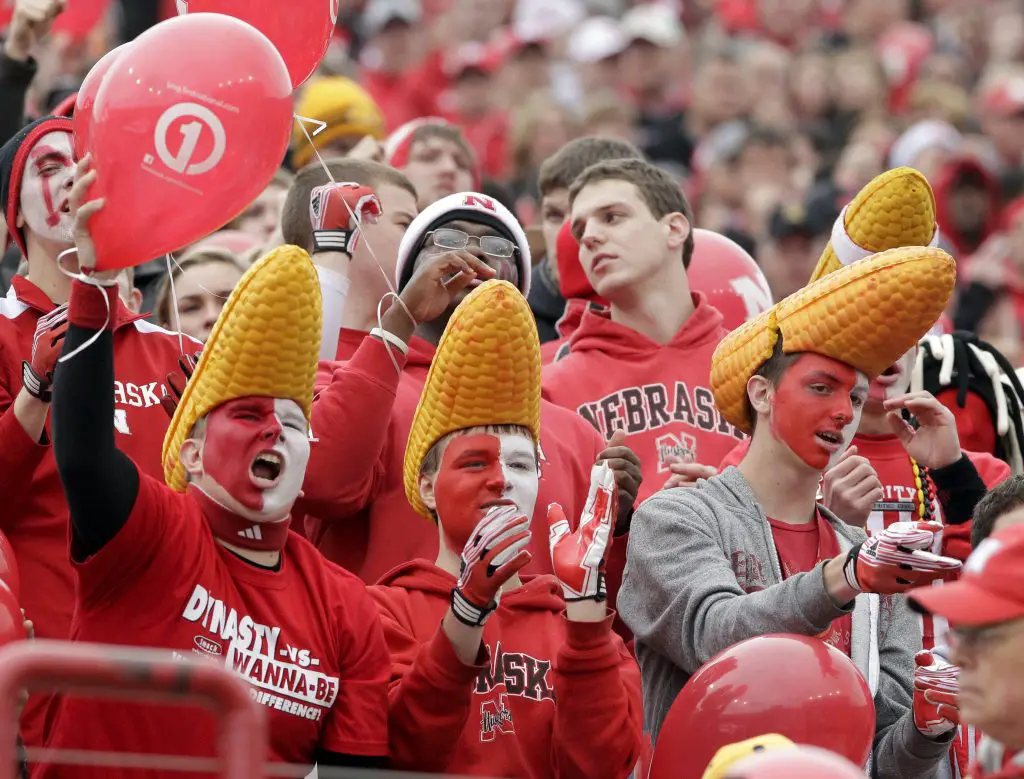
This may be your last chance to really show off your school pride; it’s a time to be proud of the institution that’s been your home for the last few years. Try to find a school event to attend, whether you’re a sports, music or theater fan — or something else entirely — there is bound to be a school event that will interest you.
Try something new, go to an event you’ve never been to before and meet some new friends. Making connections in college is important, so spread your wings in your last few weeks and meet as many new people as you can. You’re all future alumni, so you’ve got to stick together.
3. Explore the campus

This may seem like a weird one, but depending on which university you’re at, there’s probably a lot of the campus you’ve never seen. Now’s your chance to go take a peek at the science labs or head over to the poetry center.
There’s a lot to explore at a big college campus; may find a building with an amazing cafe or a hallway with a captivating student art gallery. There’s always a section of the school left to check out.
4. Student discounts

Arguably the best part of attending college is the student discounts . You can get discounts on just about anything from food, movies, museums and so much more. Use the time you’ve got left to take advantage of the low priced goodies. Your student ID card can help you save money on all the things you want to do and see, even while you’re stuck paying high fees for that education you’re getting.
There’s also lots of places that have “Student Nights,” meaning you need a valid student ID in order to even get through the front door, so check out your local events and see if there’s anything interesting going on. These events could include pub crawls, museum nights and movie marathons. There are a lot of “student only” events where you’re bound to make a bunch of new friends as well.
5. Communicate with your professors

This is something almost no one will ever tell you, but making a lasting impression with your professors is important. Down the road when you’re applying for your dream job, you’re probably going to need a fantastic recommendation letter.
Now is the time to start talking to your favorite professors and leave a lasting impression, so in a few months when you call or send them an email asking for that recommendation, they may actually be able to put a positive description to your name.
Most college professors teach hundreds of students every single semester, so make sure you’re actually communicating with your professors and being a student they’ll always remember for the right reasons.
Talking with your professors is also a good habit for being able to get along with your superiors. After your college graduation, there’s probably always going to be someone right above you until you achieve that dream job of yours, so if you can form a relationship with your professors now, it’ll be easier to do so with your future employers and you’ll be climbing that ladder to the top in no time.
6. Make friends

You probably already have a bunch of life-long friends that you’ve made over the last several years at school but now is your chance to talk to everyone you would like to spend time with. That one kid in class who always seems to have the answer? Chat them up and get to know them, they could be super intriguing and a good card to have in your deck.
Make more friends than you ever thought you could possibly need. Making connections with so many different people will definitely help you out down the road with future projects. Take advantage of the diverse group of people you pass by every single day and strike up a conversation with your fellow students.
These last few weeks leading up to college graduation are the perfect time to jump out of your comfort zone and milk the perks of being a college student that you may have not realized before. Soon all these benefits will disappear, so experience as many as you can before you’re stuck having to be a real adult with a full-time job and worrying about student loans.
- bucket list
- college bucket list
Michaela Sickles, Suffolk University

Writer Profile
Michaela sickles, suffolk university print journalism & creative writing, leave a reply.
Your email address will not be published.
Save my name, email, and website in this browser for the next time I comment.
Related Posts

Create a Bucket List To Get the Most Out of This Summer

Androgynous Graduation Outfit: A Guide to Androgynous Fashion

After Graduation, What’s Next?

How To Stay Motivated After Graduation

The Home Stretch of Senior Year Can Drag Students Into a Downward Spiral

Club Penguin in The Time of COVID-19: Keep Calm and Waddle On

Our School Year Might Be Cancelled, but Our Graduation Doesn’t Have To Be

Cities of Success: Where College Students Should Move for Their Careers
Don't miss.

Bridgit Mendler: Where Is She Now?

What’s the Obsession with ‘Bluey’?

Exploring the “Obsessed Artist” Trope in Film

The Parallels Between ‘The Talented Mr. Ripley’ and ‘Saltburn’

The Wonders of Weeki Wachee
- Australia edition
- International edition
- Europe edition

Ten things I'll miss about being a student
With graduation looming I've found myself becoming nostalgic about student life. Here are some of the things I'm going to miss the most.
1) Student discounts
Most shops have special offers for students. Two-for-one deals and 10% off promotions are great when you're cash strapped. But it's a privilege that you'll lose after graduation. The prospect of paying full price for a pair of jeans is not an enticing one.
2) Going to lectures in my pyjamas
Being a student is perhaps the only "job" in the world where you can turn up in a onesie and not cause a stir. I doubt prospective employers will be quite so accepting of my Spiderman onesie.
3) Four-month summers
At times, being a student can feel like a full-time job, but without wages. But no matter how stressful things get, once it hits June you'll be rewarded with a four-month holiday. The real world is not so kind – you'll be lucky to get four weeks off a year. Make the most of the holidays while you can.
I've been in the same flat since halls and although it may have gross carpets and a fridge that doesn't close, it has become home. Despite its faults (and partly because of them), I've grown to love this place. Moving out will be surreal.
5) My Mum's overwhelming pride
Whenever I return home I'm told by my Mum just how proud she is. She tells anyone who will listen. "Oh my son? He's at university studying law."
Once I graduate my Mum will have to get used to telling people: "Oh my son? He's unemployed and lives at home."
6) The student overdraft
Banks have come in for a lot of criticism in the wake of the financial crisis, but students aren't so scathing: a generous bank overdraft funds many of us through our degrees. Unfortunately this is something I'll soon no longer be entitled to.
7) The student loan
Look at the face of a student who's just found out their loan has been paid, and you will witness a moment of euphoria.
8) The uni bar
The university bar is a student favourite – especially if you want a night out but only have some loose change and a few spare buttons to your name. Sadly it's not acceptable to drink in student unions when you're not a student. I'm now going to have to get used to breaking the bank for a pint.
9) The library
The all-nighters I've had to pull in this place means a large part of me would happily see it bulldozed. But the library is probably one of the best perks of being a student. Cheap coffee, easy computer access and up-to-date facilities mean university libraries leave their public-funded counterparts in the shade. My local library at home still runs Windows 2003.
10) My friends
The group of friends I've built up over the last few years have helped to make my university experience. Soon we will go our separate ways: some of us will be in different parts of the same country, some in different countries altogether. I'm sure we'll keep in touch, but the end of university represents the end of an era.
There will be some things I won't miss about university, like endless coffee-filled nights writing essays, but the fact is student life has been a fantastic experience. It's helped me grow as an individual.
I know I will look back on these years as the happiest (and possibly easiest) of my life. The step into the real world can be a scary one. If only we could be students forever.
What will you miss most about being a student? Or if you've already graduated – what do you miss about your student days? Share your thoughts in the comments section below.

- Blogging students
- Higher education
Comments (…)
Most viewed.
More From Forbes
The perks and realities of working in college.
- Share to Facebook
- Share to Twitter
- Share to Linkedin
Nearly 14 million U.S. college students are working at least part-time while pursuing a degree. Unsurprisingly, most are choosing to work for financial benefits, some even out of financial necessity. But these part-time jobs in college have more to offer than just a paycheck.
Working while attending school gives college students the opportunity to apply concepts learned from professors and textbooks to real world situations, as well as gain professional skills that aren’t necessarily taught in the classroom.
Millions of students are opting to work inbetween their college courses.
Cameron Clark , currently a second year law student at Harvard University, worked between 10-20 hours per week while completing a Bachelor’s degree in Sociology at the University of Texas, Austin.
His initial reasoning for seeking out a part-time job was monetary. His family was financially strained at the time, and he needed to find a way to support himself. But after taking a job at a resume editing company, Clark quickly realized there were more benefits than just the paycheck.
“As a pre-law student, I realized my application would be supported by work experience. My job was not at all related to my degree field, Sociology. But by having a job that gave me experience outside of that, I was able to add something additional to my resume,” said Clark.
With recent reports showing that only half of U.S. hiring managers feel that today’s new graduates are well prepared for the professional world, there is more pressure than ever for students to find a way to get early practice in professional skills such as time management, communication, and attention to detail. Working while still in college provides an opportunity for earlier development of these skills.
Ashley Paskill , a student at Temple University working multiple part-time jobs, credits her jobs with helping her improve her time management skills.
“Having to work a couple of jobs and balance school all at once has definitely helped me work on managing my time,” said Paskill, “It’s helped me learn to pay close attention to my schedule and learn how to juggle multiple priorities at once”.
College jobs can also help students gain greater clarity over their own personal career goals by giving them a chance to “try” different positions with fewer strings attached.
In his job at a resume editing company, Clark wore many different hats throughout the two years he spent there. Though he started out in an entry level position making small edits to submitted resumes, his role with the company soon changed and his responsibilities grew. At some point, he was given the chance to hold roles in the business covering client consultation, quality control, training, and even management of new employees.
“I had the opportunity to experience different positions throughout the company. It gave me the chance to see how all of the little pieces and departments come to together to create a holistic company,” said Clark, “Because of that, I had a better understanding of business overall”.
Some students forgo these opportunities out of fear that a part-time job will distract them from school. However, research shows that students who work between 10-15 hours per week during college are actually more likely to obtain a Bachelor’s degree.
But it is important that they limit the hours spent dedicated to these jobs and seek out positions that provide them the flexibility to juggle both work and school.
“Finding a job that allows you to keep school your priority is key,” said Erin Goodnow, CEO of Going Ivy , “Talking to your manager about flexibility in scheduling, especially leading up to finals week, is a skill you'll need your entire career. Your mistake is to think of balance as having to be equal. School comes first. If you see signs that your work isn't supporting your educational priorities, it's time to look for another job”.
But finding a job that provides flexible scheduling is only half the battle. Students need to also be vigilant in keeping their priorities balanced themselves.
For Clark, this meant designating specific days of the week for certain tasks. For instance, he would set a Monday, Wednesday, Friday class schedule and dedicate those days entirely to school. This left Tuesdays and Thursdays for him to set time for work and focus solely on those tasks.
“It helps to functionally separate your responsibilities and get your head fully into that one space. Tell yourself ‘Okay I’m studying now and my goals for studying today are this’,” said Clark, “This helps you get fully focused on that one thing and helps you to accelerate in more than one priority.”
With so many moving parts, it’s easy for students to feel overwhelmed. So organizing schedules and managing time also means fitting in personal time.
Paskill admits that it can sometimes feel daunting trying to balance finishing up her degree and working multiple part-time jobs. Her answer is to always make time for herself to avoid feeling too stressed.
To help manage her busy schedule, Paskill uses a planner to map out her weeks and days, and marks down specific time for her to relax and spend time with her friends and family.
“Don’t forget to take care of yourself. Be able to manage your stress and relax. Make it a point find time to be around your friends and family,” said Paskill.
- Editorial Standards
- Reprints & Permissions
Working as a student assistant
Blogger elisabeth sandler, a master’s degree student of educational sciences at the university of innsbruck, austria, offers a unique perspective on the benefits of working for an academic during your studies..

Elisabeth Sandler
Considering applying for a job as a student assistant at my university, I was desperately seeking for an article or any kind of information about the duties, tasks and challenges in that position.
Despite an only vague idea and limited understanding of what could await me, I applied and got the job. Now, with an eight month working experience I would like to unveil the more or less hidden secret of student assistants and to provide an insight into the everyday life of a “professor’s brownie”.

Join the THE Student community and unlock free benefits
First of all I would like to mention that since student assistants commonly work for only one professor, tasks as well as the range of responsibilities vary. Your job is to support your professor academically, in any form whatsoever. Therefore, this article depicts only an example of a daily routine performed by a student assistant working in the disciplines of social science and humanities. However, I hope my experiences contribute to a wider impression and maybe obtain clarity for those who are thinking about entering the academic food chain.
“So, what exactly do you do?”
In trying to answer that question – way too often heard to reply in the same boring and memorised way – I have developed a range of answers over the last few months. “Well, basically you are doing everything your professor does not want to do” is my humorous response delivered with a wink and mischievous smile. But to finally provide an informative reply, most of the time I am looking at the current state of research and researching or obtaining scientific literature and statistics. On that point, I am spending a lot of time working with databases, going to the library and trying to comprehend research papers as fast as possible in order to pre-select and offer something that might become the fundamental basis of future research and lectures. No pressure!
Further tasks are proofreading, organising literature, creating reference files and projects, complementing bibliographies, quoting, photocopying, scanning and in rare cases translation work.
Moreover, and referring to the previously mentioned comparison with mythical creatures named brownies, student assistants do a lot of work that is often imperceptible and almost invisible for an outside observer. To name just a few: organising, communicating and maintaining an overview of (return-)deadlines and the body of literature.
Is it the right position for me?
As in any profession, there are some requirements and desirable abilities that are important, helpful and some even imperative to have. Based on these, the following questions can help to work out if the job is right for you:
- Are you stress-resistant?
- Can you multi-task, organise and communicate in a team?
- When considering your current life situation, can you afford to work intensively on maybe a different topic or research area and maybe work more hours than you get paid for?
- Are you good at carrying books?
- Are you prepared and educated enough to support the research process?
- Are you interested in the research area the academic you would work for is focusing on?
What's more, I advise you to gather concrete information about the area of responsibilities in advance. Ask at the secretary’s office, your department, and particularly for experience reports from current or former student assistants. You will get the opportunity to ask at an interview, when they will ask you "Do you have any questions for us?”. If you are not asked that question you can take the initiative as a last resort; preferably at the very end.
The perks of being a student assistant
It goes without saying that employment as a student assistant can have tremendous advantages and benefits. Nine months ago I realised that this view was already widespread; the amount of applicants mirrored the interest in that obviously coveted position. So let us have a closer look on the dreams, hopes and realities associated with this job.
First thing's first: As an (undergraduate) student, you cannot really get a better position or actually a position in the academic sector at this certain point of your education. Especially when considering an academic career, work experiences as well as networking are advantageous. Further perks are:
- Valuable insights into the everyday life of academics, researchers, scientists, lecturers, PhD candidates and secretaries. These insights are limited to some extent due to fewer working hours as a student assistant. Nevertheless, you get an idea what it is like and what they do. This might contribute to casting off the rose-coloured glasses and seriously reflect on whether it is the true path for you. Moreover, it broadens your horizon and leads to a better understanding of the effort and energy everyone puts in. This again helps you to appreciate university and your privileged position as a student even more.
- At this early stage in your academic career it can only be considered helpful to know the rules. What do I mean by that? In every institution unspoken rules dominate behaviour. Some name it “internal socialisation” and others would say you are developing a certain “habitus” (referring to Pierre Bourdieu). This enables you to freely move in the field of academia. Feeling safe to address academics or dignitaries, talking to them, discussing and exchanging ideas, all of this becomes possible.
- Being present and known at your department may reveal itself as a “professional springboard”.
- Since your job is to support the research process, you are in ongoing academic training, updated in the current stage of research and you are very likely to acquire new knowledge as well as guidance by professionals.
- Lastly, being needed and feeling important and valuable is a marvellous feeling and very satisfying.
Before I finish, I wish to emphasise how grateful I am to experience working as a student assistant and that I am able to pass on my knowledge and experience. I was warmly welcomed in my team from the very first day and although I am working under time pressure and carrying many responsibilities I personally think it is absolutely worth it!
However, this cannot be taken for granted and the job might not be right for everyone. I personally think that because it demands and asks much of you, the position of a student assistant polarises people, so you can tell quickly whether you like it or not.
Some final words: Take action, do not be ashamed to ask for further information or to talk to professors, know about your aims in life but also dare to question these. Maybe you will find yourself in the position of a student assistant one day, maybe not. But do not only do it for the benefits in the future. The most important thing is that it suits you! It is your first contact with academia and this one should be pleasant. At least that is what I wish for you.
You may also like

.css-185owts{overflow:hidden;max-height:54px;text-indent:0px;} Tips for choosing and applying to universities
Laura Warner

Why study German?
Niamh McShane

A day in the life of a UK university student

How do I choose a master's?
Charlie Pullen
Register free and enjoy extra benefits
- Share full article
Advertisement
$500 signed
Branded vodka
“Buzzer beater”
The Many Ways Men’s Sweet 16 Players Are Being Paid
By David A. Fahrenthold and Billy Witz
This year’s N.C.A.A. basketball tournament is being played amid a revolutionary change in college sports: The best players are now openly recruited, retained and rewarded with cash.
That change began in 2021, when the N.C.A.A. — under pressure from the Justice Department and state legislatures — allowed players to be paid for the use of their “name, image and likeness.” The idea was to let players endorse shoes or sports drinks.
The new system was overrun by groups called “collectives” — made up of wealthy boosters who donated money, and in some cases raised even more, to pay athletes based on their value to the team. Now, there are hundreds of these groups, and big-time players can make salaries that, for a select few, can surpass $1 million.
Those big bucks and the loosening of transfer restrictions have turned the off-season into something like pro sports free agency — for male players, at least. (The average men’s basketball player with a collective contract at a top school is paid $63,450, according to Opendorse, a company that processes payments to players from collectives. The average women’s player gets $10,610.)
The N.C.A.A. tried to police this new system, then stopped last month after a federal judge said that N.C.A.A. rules likely violated antitrust laws . Every team in the men’s Sweet Sixteen has been touched by this change, which has brought windfalls to players but instability to the college game.
Select a Sweet 16 team to learn more about its collective(s).

The collective that supports the University of Connecticut’s teams, Bleeding Blue for Good, is the rare one that pays out more to men’s and women’s basketball players than it does to football players, according to its president, John Malfettone, who declined to disclose figures. A commercial for Bleeding Blue for Good, featuring UConn basketball players and encouraging donations, aired before the men’s tournament opener. Another way the collective raises money is by selling basketballs autographed by last year’s national championship men’s team — for $500 a pop. The collective pays players to teach at youth basketball camps and work with state charities.
Above: A basketball signed by UConn players

San Diego State
Guard Lamont Butler hit a last-second shot to win the national semifinal game last year. This year, Butler is still in college — and making money off that shot. San Diego State’s collective sells framed photos for $555 — Butler wears No. 5 — and a San Diego restaurant pays Butler to endorse its new “Buzzer Beater” quesadilla.
Above: Lamont Butler next to the “Buzzer Beater” quesadilla
Illinois’ ICON Collective is a nonprofit, which says it gives 90 percent of donations to athletes for performing charity work. The I.R.S. has recently raised questions about that model, saying that collectives that pay most of their money to athletes may not be charitable enough. The I.R.S. has said it will audit some collectives to determine if they still merit tax exemption.

Trying to diversify its income stream beyond wealthy donors, Iowa State’s We Will Collective now raises money to pay athletes by selling branded beer, vodka and We Will Gluten-Free Meat Lovers pizza.
Above: Iowa State-branded beverages
North Carolina
The N.C.A.A. is now seeking to loosen its rules about schools working with N.I.L. collectives, and U.N.C. is already moving toward centralizing three now-independent collectives and taking a tighter grip on them.

The University of Alabama’s collective, which has both a for-profit and a nonprofit side, releases few details about its activity. Last year, Elliot Maisel, a board member of the nonprofit, told The New York Times that its spending was entirely dictated by the school’s athletic department — despite N.C.A.A. rules that barred schools from securing payments for players. Days later, Mr. Maisel reversed himself, saying he did not know how his group spent its money after all.
Above: Alabama guard Mark Sears
Clemson University used to have a large nonprofit collective, but it closed down after the I.R.S. said paying athletes should not count as charity — a warning many collectives have seemed to ignore. Now, Clemson’s main collective is a for-profit organization run by a former university employee.
Like most everything in college sports, N.I.L. collectives are dominated by football. At the University of Texas, about 70 percent of all N.I.L. payments have gone to football players, according to statistics provided by the school. Arizona, though, has sports-specific collectives. Arizona Assists gets money to men’s basketball players. Joining as a Corporate Cat requires yearly contributions of more than $10,000.
The University of Houston’s collective, LinkingCoogs, signed a $350,000 deal for the basketball team to endorse a Houston personal-injury lawyer, according to the news site on3.com . They could have used an advocate on Sunday, when four players fouled out in an overtime win over Texas A&M.
Houston players endorsed a personal injury lawyer on Instagram in March.
In 2022, Duke’s basketball team was among the first to hire a dedicated “general manager” to help players seek out N.I.L. income. Before this general manager gig, Rachel Baker worked at Nike, building the brands of professional athletes like Kevin Durant.
What kind of perks do donors to these collectives get? At N.C. State, the Savage Wolves collective sent an athlete to cheer on one of its donors’ sons during the son’s lacrosse tryout. “This kid was looking at him like he was Superman,” said Tom Livolsi, who runs the collective.

Marquette University coach Shaka Smart focuses on an unusual statistic: deflections, meaning times that one of his players tips or redirects an opponent’s shot or pass. Marquette’s Be the Difference collective has now asked fans to donate money for each deflection during the tournament. Smart tells players he wants 32 deflections per game, so those pledges could add up.
Above: Marquette University coach Shaka Smart
N.I.L. payments to international players are bound by strict limits on their ability to work in the United States. But Zach Edey, the team’s star Canadian center, has still benefited from what are considered “passive” endorsements, which are allowed. Mike Bobinski, the school’s athletic director, said in an interview last year that Edey made money off of his photo on soda cups sold in the team arena’s concession stands, as well as merchandise in stores on campus. Purdue’s collective, the Boilermaker Alliance, has also lined up agreements with three Canadian charities. Altogether, Edey’s N.I.L. compensation is believed to come close to or match what he could have made on a professional contract had he left the school after last season.
Gonzaga’s collective is run by the B.P.S. Foundation, a tax-exempt charity that puts donor money at the disposal of for-profit collectives, letting the for-profit entities determine how money is given out. (Arizona also has a collective run by the B.P.S. Foundation.) Tax experts have said nonprofits should operate independently. But the approach is working: The B.P.S. Foundation saw revenue climb to $14 million in 2023 from $3.4 million in 2022.
B.P.S. Foundation annual revenue
$14 million
$3.4 million
Creighton’s business school offers athletes an N.I.L. seminar, with topics like how to file their income taxes and how to build a personal brand. Players also get paid by The Bird Club, its men’s basketball collective, for events with kids. Last year, one of them included a dunk tank where kids got to dunk their favorite players.
The University of Tennessee’s collective, the Volunteer Club, was under investigation by the N.C.A.A. for flying a quarterback prospect who agreed to an $8 million N.I.L. deal to Knoxville on a private plane. But Tennessee’s attorney general sued to stop the investigation, and a federal judge ruled that the N.C.A.A. could not stop collectives from offering cash to attract recruits.
Produced by Charlie Smart . Noah Weiland contributed reporting. Photos by Denis Poroy/Associated Press, Young Kwak/Associated Press, Michael Conroy/Associated Press.
Inside the World of Sports
Dive deeper into the people, issues and trends shaping professional, collegiate and amateur athletics..
Minor League Baseball’s Real Estate: The fight over a new stadium for the Eugene Emeralds highlights a wider challenge for cheaper alternatives to big-league live sports.
New York’s Favorite Soccer Team: Some people splurge on vacations, fancy shoes and motorcycles. A group of dozens of friends, neighbors and co-workers decided to try something better (or maybe worse): They bought a middling soccer team in Denmark .
Here Comes Padel: The sport is played with a racket on a court with a net, but watch out for those bouncing shots from the back wall. Reporters take a look at the padel scene in New York City .
Have the Brands Gone Too Far?: Runners at the Boston Marathon are disappointed that the new finisher medals feature a large bank logo across the bottom.
How Soccer Embraced Ramadan: In competitions like the Premier League, Muslim pros who once faced pressure to avoid daily fasts during the monthlong holiday now benefit from custom diets and in-game breaks.
I travel 514 miles to get to work. I thought it was a crazy idea at first, but supercommuting is now exciting to me.
- Susan Miller, a professor, supercommutes weekly from New York to Michigan.
- Although the school doesn't cover her commute, Miller enjoys the different atmosphere in Michigan.
- Despite potential downsides, Miller encourages others to consider supercommuting if given the chance.

This as-told-to essay is based on a conversation with Susan Miller , a professor at the Ross School of Business, University of Michigan, living in New York. It has been edited for length and clarity.
In January 2022, I began my weekly commute from New York City to Ann Arbor, Michigan. There, I teach a wide range of college classes as a full-time professor at the University of Michigan Ross School of Business .
As a supercommuter, I think I have the best of both worlds: I teach bright, well-rounded, caring students from around the world, and I get to return home and take advantage of everything that makes New York City exciting and interesting.
I book my airline tickets months in advance and spend between $120 and $250 for a roundtrip flight. My supercommuter schedule both energizes and fuels me, and I don't see myself stopping anytime soon.
I had never supercommuted before this job
I began my career working for large companies, including Xerox, Colgate, American Express, and Warner Bros. My experience ranges from marketing and business development to brand management and licensing. Later, I was an entrepreneur and built a few companies.
While I traveled for all of these work experiences, I never had to commute weekly across state lines like I do now.
I get to enjoy an atmosphere and culture different from NYC. And it usually takes no more than two hours to fly between New York and Michigan . I sometimes joke that it takes me fewer hours to get from my NYC apartment to Ann Arbor, Michigan, than going on the Long Island Railroad into Manhattan for the 23 years I worked there.
Michigan has a different vibe, and I like it
I graduated from NYU with an MBA, so I often get asked why I don't just teach in NYC. There's something about Michigan — the Midwest. I can't explain it. The vibe is just different, and I like it.
When I'm on campus, there's a hyper-focus on being there a few days and then getting to come back home that I wouldn't get to experience if I were not supercommuting back and forth.
When I'm in Ann Arbor, I stay in a hotel attached to the business school and enjoy the faculty rate. I take a 180-step commute from my room to the school. There's an ease of living on campus in a hotel. I don't have a kitchen, so I usually dine at friends' houses or eat out.
Related stories
I know the hotel staff, and it feels like my second home, without the upkeep.
I didn't become a supercommuter all at once
Starting in 2007, I became a regular guest speaker at the university. I'd been invited by my son's then-girlfriend to serve as a guest speaker in various student clubs — they were both sophomores at the school. While at one of these events, I met a woman named, Dr. Mary Hinesly, who asked me to guest speak in her class.
When Mary became head of her department in October 2021, she invited me to guest speak again, and then she asked if I'd be interested in teaching there full-time.
My initial reaction was that I was flattered but that it made no sense, as I live and work in New York and the school did not offer to pay for my commute . After sleeping on the offer, I called back and said, "It made no sense, it was crazy, but I was in."
Teaching in Michigan has plenty of perks
I get to teach at one of the best business schools in the country with wonderfully well-rounded students, and I have lots of football players in my classes.
One of the best things this year was seeing our football team win the national championship because I had so many of these athletes in my class. There are many events each week, and I can attend anything, including sporting events like basketball and lacrosse — two of my students are captains.
Being around my students is like breathing oxygen, and spending time with them makes me optimistic about the future.
Other than that, I enjoy the fresh air from the lakes and the nature of the Midwest, as opposed to city life.
Supercommuting has made me a better traveler
I know how to navigate flights and Ubers. Plus, I've learned how to maneuver quickly around crowded, bustling spaces — I'd even say I've gotten physically fitter after dashing through airports so many times. I can pack a small bag fast and cut my airport arrival down to the minute. Knowing how to avoid intense NYC rush hour helps me keep my commute short.
I learned how to increase my perks with Delta, as the Detroit airport is a Delta hub. I got an airline credit card , where I get a 15% discount on Delta flights, and just reached platinum status. I've also mastered the app, where I accrue miles I use for flights.
I'm already booking my fall 2024 flights, so I can fly cheaply, and I've learned to take advantage of the Delta Lounge for breakfast.
Supercommuting could have some downsides for some people
A few of my flights were canceled, but Delta has a flight from New York landing in Detroit almost every hour. If I'm ever running late, there's always a chance I could miss a flight and wait for the next one — but I haven't missed a flight yet.
Supercommuting can feel like you're living in two places, which might wear some people out. It could also be a problem for people without proper childcare. However, having grown-up children has made supercommuting easier for me.
I've met many people who supercommute . If an opportunity to supercommute intrigues you, I'd say go for it. You can be anywhere around the country with flights if you plan accordingly.
Watch: How truck driving became one of the worst jobs in the US
- Main content
to submit an obituary
Monday-Friday 8:30am-4:00pm, Call 610-915-2226
(Proofs will be provided for accuracy only, they will not be styled/formatted like the finished product)
Obituaries submitted on Saturday, Sunday and Holidays are accepted from 8:30 a.m. to 3:00 p.m. by email only [email protected]
(No proofs will be furnished. Pricing will not be available until the next business day after 10:00am by calling Dianne at 610-915-2226)
Obituaries received after Deadline will not be published in the following edition of the paper.
Sending Procedure:
Email is the preferable method for receiving Obituaries (and the only method on Saturday, Sunday and Holidays), they can be sent to [email protected] (Feel free to call and confirm that we’ve received the email)
Formatting:
Obituaries will continue to visually look the same as they currently do, but you will no longer be restricted in what you can say (ex. As much Family can be listed as you’d like; Wording like “Went to rest with the Lord” is now permissible)
There is a cost for each obituary. Pricing and payments are only available Monday through Friday, 8:30 am to 4:00 pm. All weekend and holiday submissions will be provided a cost the next business day.
Exceptions:
All New accounts, Out of State Funeral Homes and Private Parties will require prepayment upon approval of the obituary. Weekend and Holiday staff are not authorized to set up a new account or process payments
Deadline for the above is before 4:00 PM Mon – Fri. only (Holiday schedules may vary).
Prepayment required submissions will be handled on the very first business day following the weekend and/or holiday schedule. A complete name, address and best contact phone number are required upon submittal of your obituary request to set up your account. A proof will then be emailed for review but placed on hold until payment is received.

Sponsored Content | The 7 Best Essay Writing Services in the U.S.
Share this:.
- Click to share on Facebook (Opens in new window)
- Click to share on X (Opens in new window)
Sponsored Content
We’ve identified the top seven online essay writing services, picking only the cream of the crop based on a multitude of genuine reviews and comprehensive research from our side..

PaperHelp has very high customer service ratings, with a 4.7 out of 5 rating according to more than a thousand reviews as of April 3, 2024. Ease of use, quality of custom papers, and value for money are the most-cited reasons for the high ratings given to the company by undergraduate students.
We consider PaperHelp to be the best essay writing service in the United States and beyond due to the consistently high quality, originality, and value for money it provides to its customers.
The company allows the customer to be involved in the paper-writing process from its very beginning. You can get updates from the writer, review the essay while in progress, and request free revisions if needed. You get three revisions for free, which is usually more than enough to get the required result.
PaperHelp offers a variety of writing services, including essay, research paper, thesis, and dissertation writing for every level of academia.
In addition, PaperHelp gives plenty of bonuses and discounts for both new and regular customers. There is also a great loyalty program that enables students to save money on future orders, making it a good choice for resellers.
- Great value for money, affordable
- Suitable for most academic assignments, including Ph.D. papers
- Papers are always plagiarism-free
- Great loyalty program for regular customers and resellers
- Most essential extras are paid and expensive
- It takes quite some time to find a suitable writer for Master’s degree assignments
No matter the level of academia you are working in, PaperHelp can provide high-quality, original, written-from-scratch, plagiarism-free essays at a great value. We highly recommend PaperHelp to students as the top college essay writing service in the United States.
2. BBQPapers — The Best Essay Writers, Premium Service

BBQPapers offers high-quality research papers and essays, plagiarism-free, and a high level of customer service. In addition, the company claims to have professional-level editors in the top 2% of academic excellence write and review your essays.
BBQPapers have a process whereby each paper is checked against the web and its own database for originality. BBQPapers also offers free revisions within ten days, accurate citations, professional editing, and a 60-day money-back guarantee.
BBQPapers offers incentives in the form of loyalty program discounts and a “pay as you go” zero-interest plan option for projects priced over $500. The company also offers standalone editing and proofreading services and custom services for odd academic assignments.
This service guarantees security and confidentiality to its customers and guarantees the quality of the papers it produces for students.
Pricing is around $6 per 100 words, with editing and proofreading priced separately as standalone services. This is a bit pricey for writing services in the United States compared to the others we reviewed.
- The best quality among all essay services, writers are Ph.D. and M.A. degree holders
- Extra long money-back guarantee (60 days)
- Pay as you go option for expensive papers
- 99% of the writers are native speakers of English
- Essential add-ons are free
- Prices are above average
- Writing samples are not available
Customer satisfaction with BBQPapers is high. Students appreciate the quality and security this essay service offers to them and have been largely pleased with the final results, garnering good grades for their submissions.
3. MyAdmissionsEssay — The Best Service for Application Essays

Even though the name suggests that this company specializes solely in admission essays, this website offers writing assistance with various academic tasks to all levels of academics, from high school to Ph.D.
In addition, this professional essay writing service boasts a pool of diverse writers with a variety of language skills. Your paper will be written from scratch by a well-educated writer in that particular field of interest. College papers are delivered quickly, as soon as 3 hours turnaround time.
Students may give specific instructions and have access to the writer during the process, as well as opportunities for revision to get the paper edited to their satisfaction.
This company guarantees confidentiality, safety, and plagiarism-free original content written according to scholars’ instructions.
MyAdmissionsEssay has some great reviews on the site, but there are not many available. Customers appreciate the quality of the writing and the quick delivery times.
The pricing of this essay writer service is competitive and affordable, and the service offers 24/7 online support to its customers. The company’s online pricing table is transparent and easy to navigate.
- Best and affordable option for personal statements
- Professional editing & proofreading service
- Quick turnaround
- Truly confidential service
- Limited payment options, the service doesn’t accept PayPal
- Minor typos and grammar errors found in final product
This service seems best for personal statements and simpler essays. Some customers complain of minor mistakes or formatting errors, and students dislike the limited payment options offered by MyAdmissionsEssay.
4. WritePaperForMe — The Cheapest Paper Writing Service

WritePaperForMe made our list because of its reputation as a truly cheap essay writing service with good quality and customer support.
This service provides the best value for money. If you’re a student on a budget, this is a great service to consider for a simple and original essay with fast delivery at an affordable price.
WritePaperForMe promotes customer-centered service with round-the-clock support as well as free revisions to get your paper exactly where you want it before you submit it. This essay writing company also offers complete confidentiality to college students using its essay services.
Using WritePaperForMe is safe because it has been rated 4.8 out of 5 stars for customer satisfaction, according to hundreds of customer reviews on SiteJabber and other review platforms. In addition, most reviews state that students received good results. Generally, quality and efficiency were also highly rated, but mostly with simple requests.
WritePaperForMe is a place where you can hire a cheap essay writer who is knowledgeable enough to write a short, simple essay that you just don’t have enough time to write yourself.
This site has hundreds of writers online and takes pride in the speedy delivery of good-quality papers. The WritePaperForMe website also provides quite a few essay samples listed by category. Students have free access to these essays and excellent customer support for ordering the perfect paper to suit their needs, regardless of topic.
Some customers complained that some of the writers struggled with research-intensive assignments like research papers and dissertations, but the general response to this service was positive.
- Quick and truly affordable
- Great customer service
- Might not be the best option for anything but essays
- Plagiarism report is a paid add-on
We would advise hiring a more professional paper writing service for more in-depth and important papers. WritePaperForMe might not be ideal if you need someone truly knowledgeable to work on your STEM research/term paper, thesis, or dissertation.
5. GradeMiners — The Fastest Writing Service

This college paper writing service has gone through some changes over the last couple of years. With time, customer reviews of this site are becoming better and better.
GradeMiners is striving to improve its quality, and it shows. This academic writing company is getting high ratings for speedy delivery, updated satisfaction guarantees, and incentives for return customers.
Those incentives are now present in the form of daily discounts and exclusive email offers for return customers who sign up for the newsletter, something that wasn’t available back in the day.
In addition to academic writing services, GradeMiners also offers homework help and problem-solving assistance for high school and college-level students.
This service has fewer professional college essay writers than other sites, and the company generally employs ESL writers. This service offers writing in everything from academic papers to thesis and dissertations.
GradeMiners offers a money-back guarantee as well as free revisions for up to 30 days. The company received a 4.6 out 5 customer rating and claimed to deliver 70% of its orders earlier than the specified deadline.
In spite of claims, discounts, and guarantees, reviews on some services are mixed. Pricing is of great concern because there is no dedicated pricing table for services.
- Great option for rush orders and last-minute papers
- Extra long revision period of 30 days
- Writers are professional enough to handle most papers
- The prices are somewhat high
- Mostly ESL writers
Overall, GradeMiners prices out as a more expensive option than other comparable services. For some students, the trade-off for fast delivery makes it worthwhile.
6. EssayPro — One of the Most Popular and Reliable Services

EssayPro offers features and perks that other essay writing websites do not. For example, it allows you to browse its writing staff and choose your own writer based on their academic qualifications, areas of interest and expertise, as well as past customer ratings and reviews.
Once you’ve chosen your paper writer, you have access to free unlimited editing, a free title page, and around-the-clock customer support.
EssayPro is certainly a legit essay writing website that offers professional services and has the best reputation for quality, security, and customer satisfaction.
In addition, the company guarantees confidentiality and anonymity so that no one ever knows that you outsourced your essay.
Some customers complain that this service is overpriced, but we found EssayPro to be quite competitive in terms of price. Papers with a shorter return time will be more costly. The more lead time you give, the more writers will garner you a break on the price.
Access to the writer during the process and unlimited editing capability make EssayPro one of the most highly regarded and popular college essay writing services out there.
- Popular and trusted site
- There’s an option to choose your writer yourself
- Round-the-clock support
- No phone support
- Isn’t the best option for theses and dissertations
To make its services affordable, EssayPro mostly hires ESL writers with excellent academic credentials, giving customers a pool of talent to choose from and making the best fit possible for the subject matter being addressed.
7. EssayNoDelay — Legit Writing Service for ESL Students

EssayNoDelay is a reputable college essay writing service that comes highly recommended. It is an international company based in Bulgaria that employs hundreds of writers, most of whom are ESL.
The company provides excellent customer service via live chat and email. Turnaround times are fast for delivery, but customer service response to student emails can take up to a week, even for emergent requests.
This service, out of all the ones we reviewed, has the deepest discount for first-time customers and returning requests, but you can expect to pay significantly more for subsequent orders.
This online paper writer service has decent pricing but could do better by adding loyalty programs or better discounts for returning customers.
The quality of work from EssayNoDelay is generally good, and reviews are positive. This service boasts that 91% percent of its clients have returned to place more than 5 orders. Most complaints are with regard to minor grammatical or formatting errors in the work.
This company guarantees to provide an original, plagiarism-free paper, with a 100% money-back satisfaction guarantee on its work.
- The best loyalty program among other sites
- Good quality
- Mostly caters towards ESL students, it’s hard to find a writer from the U.S., the UK or Canada
- While first order is cheap, repeat orders are way more expensive
EssayNoDelay has proven to be a cost-effective custom essay writing service that provides professional writing assistance to students at all levels of academia.
Paper Writing Services: Common Questions, Answered
How long does it take to have my essay written for me.
Depending on your chosen service, your essay can be written within hours, days, or weeks. The longer the lead time you allow for some services, the deeper the discounts. You can expect to pay more for rush orders.
The complexity of the paper you order can also impact the turnaround time. If you need to monitor the process, make suggestions to the writer, edit the work, or request revisions after the paper has been produced, it will add time to the process.
We suggest you don’t wait too long to place your order, there are sometimes unexpected issues that can delay the delivery of your paper, and since deadlines and due dates in academia are mostly fixed, it’s up to the scholar to make sure there is enough time for the professional writer to complete the order including proofreading, editing, and revisions if required.
It’s recommended that you keep in contact with the writing service and the hired writer, in particular, to make sure that everything is to your satisfaction to avoid delays.
The responsibility falls to the student or scholar to ensure that essays are submitted to teachers and professors on time with all requirements met regardless of academic level.
Will my essay be written by a professional essay writer?
Some of the reliable essay writing services we have listed hire professional writers at all levels of academia.
Most services will allow the customer to choose the writer based on their field of expertise, academic credentials, and customer reviews posted on the website.
In addition, most websites enable the customer to select either a Native English speaker/writer or an ESL expert.
Some colleges consistently check students’ writing styles, so if you’re an ESL student, it makes sense to hire an ESL writer so that your paper only stands out a little from your own writing.
The most popular sites profile the college essay writers who are the most requested and most highly reviewed to promote them to customers.
Other services will assign the best essay writer based on the type of paper, subject matter, and level of academia needed to complete the task.
All of the services we reviewed guarantee their results and hire experts who are true professionals in their fields or have the academic experience to write with authority on the subject they specialize in.
Most of the services allow you to monitor the process. If communication is an issue, or if you are unhappy with the results, their guarantees allow you to substitute another professional to satisfy your requirements.
How much does it cost to purchase an essay?
If we’re talking about undergraduate writing assignments, the typical price for a single page is about $11-20. It usually varies depending on how fast you need your essay written. On average, a typical three-page college essay written in three days will cost you $50-110.
We advise you to be wary of some cheap essay writing services selling papers for prices lower than $9. While the price may seem appealing, it’s best to steer clear of such sites because they hardly ever deliver papers of subpar quality, let alone high-quality, plagiarism-free essays.
Is it safe to buy essays online?
Yes, you can be reasonably certain that buying papers and essays online through any of the academic writing companies that we have reviewed here will be safe and secure. By using any of these sites, your personal data will be kept confidential and fully protected.
Your school should never learn that you hired an online essay writer to produce a paper for one of your classes. This is a valid concern when employing a writing service to write a paper for you. The possibility that your teacher or professor will learn that you bought your paper online is small.
Here’s the thing. The only way these college paper writing services can continue to thrive and stay in business is to keep student data confidential and safe. Most of them post a security and confidentiality guarantee on their websites. Some students opt to give a pseudonym or merely their initials to help guarantee themselves anonymity.
The companies we mentioned in this review keep their databases secure and do not sell or share student data. In most cases, they have a customer satisfaction guarantee which covers security and quality.
If a company is offering a 100% money-back guarantee, you can wager that they are doing their utmost to avoid giving any refunds.
Are online essay writing services legit?
As with any kind of service you employ, it’s always a case of “buyer beware.” The responsibility falls on the customer to do their due diligence in choosing a reputable and honest and online essay writing service from which to purchase papers.
However, be wary of basing your decisions solely on customer reviews, as many of these companies are plagued by scores of negative reviews from scam sites provided by rival essay writing companies.
Look for well-established websites with a large pool of writers, and be sure to utilize the live chat feature that is on most of the websites, to ask the questions that are pertinent to your situation.
You want to be sure that you employ a writing service with professional paper writers who specialize in your field of study. At the higher levels of academia, you need to be sure that the writers have the academic experience and credentials to produce the quality level required for a thesis or dissertation.
When special formatting and citations are required, you will need to do diligent interviewing of your essay writer to be assured that they are able to produce the quality of content that you require.
What if I am not satisfied with my paper?
The majority of the services you will consider have a process whereby you get edits and revisions for free within a specified period of time after the completion of the work.
In some cases, future edits and revisions will be charged a fee.
Many services also offer a customer satisfaction guarantee which means that the expert essay writer you engage (that the service contracts with) promises to revise the finished product to your satisfaction, or you are entitled to 100% of your money back.
We understand that it rarely goes to that extreme. Most of the time, you will be able to obtain a final product to your satisfaction on the first try, even without asking for a revision.
If you want to achieve that, please provide the most descriptive order instructions that you can. This way, you can avoid the revision process and save yourself and your writer some time.
Part of making sure that the best outcome is to choose a writing service that employs proficient and professional essay writers in your area of study and that you give clear and explicit instructions as to the formatting, citation, and style of essay you require.
We also recommend that you check in regularly with your writer throughout the process so that you may be able to catch any issues that may arise and be able to correct them right away.
What are the main drawbacks of essay writing services?
The main drawbacks of using companies that write essays for you are the expense and the risk of discovery. While most essay writing services online are not too costly, getting into larger projects with extensive proofing and editing can become expensive, especially on a student’s budget.
While these sites generally guarantee security and confidentiality, there is always the chance that your professors/teachers may notice a change in the quality or style of your essays and figure out that you purchased the work rather than producing it.
The other drawback of using the services of essay writing websites is that you don’t benefit from the work the same way you would have if you had done the work.
If you are doing the research and the citations, you will be enriched by the process and gain knowledge in the subject from doing the work.
Using a writing service only gives you the benefit of the result, the grade, or the points you gain, rather than a more profound knowledge of the subject matter.
This has the potential to trip you up later in life when you may be called upon for that knowledge in your field of study and lack the expertise because you paid someone else to do the work.
Professional essay writing services fill a need in providing writing assistance to students at all levels of academia, but they should only be used infrequently and in urgent or timely situations where the student or scholar is unable to provide a quality essay on the subject assigned.
We understand that there are circumstances where a writing service can be a real lifesaver. Still, we caution students not to abuse these services or use them as a replacement for acquiring knowledge in their chosen field of study. Instead, when the need arises, choose a reputable service that guarantees good quality work.
The news and editorial staff of the Delco Daily Times had no role in this post’s preparation.
More in Sponsored Content

Sponsored Content | Best 15 Trusted Platforms to Buy Instagram Likes (2024)

Sponsored Content | Buy Instagram followers from these 16 best sites (2024)

Sponsored Content | Buy TikTok Followers From These 17 Best & Trusted Sites

Sponsored Content | Best Research Paper Writing Services: Top 5 U.S. Companies

IMAGES
VIDEO
COMMENTS
For example, students can get lucky, scolded, bored, and have fun. The essay also detailed how students respect teachers, pass exams, and learn discipline. 4. International Student Life by Lillian Thornton. "Studying in America has a lot of advantages, such as we can learn [about] new cultures.
Save on big brands including Samsung, Ray-Ban, and Adidas. Six College Student Benefits You Might Not Know About. Watch on. 3. College nights. Where there are colleges, there are discounts. Local businesses often try to attract students by offering special college nights. Many movie theaters, museums, and the like host nights where you can get ...
College is a stressful time, but if you use the free time to your advantage, it won't seem so bad. Being able to use the extra time you have in a mentally productive way is going to help you in the long run and be your best friend when finals week comes along. Speaking of parents, I think the time and distance you have away from them is a ...
A student subscription allows you to listen to your favorite music for $4.99 a month for up to 48 months. You also get free access to AppleTV+ for a limited time. Spotify. At first, you can stream for three months for free, and then you pay $4.99 a month with your student discount. YouTube Premium.
Figure 1.3 Your college courses will provide you with an opportunity to explore who you are and what you want to do with your life, develop mature relationships with professors and classmates, and demonstrate integrity in your work. (credit: "Early College Initiative Students Welcomed to College of DuPage 2015 23 1" by COD Newsroom/Flickr, CC ...
Money doesn't buy happiness, but a college degree can lead to greater job satisfaction and increased overall happiness. 8. Happiness and Healthy Marriages. Another reason that college graduates tend to be happier could be that a higher level of education is correlated with more successful marriages.
6. Well-written. This might also sound like an obvious quality of a successful essay, but it's still worth mentioning. The most competitive application essays showcase strong writing skills, providing evidence of a student's ability to tell a specific story artfully and well.
Table of contents. Essay 1: Sharing an identity or background through a montage. Essay 2: Overcoming a challenge, a sports injury narrative. Essay 3: Showing the influence of an important person or thing. Other interesting articles. Frequently asked questions about college application essays.
Sample College Essay 2 with Feedback. This content is licensed by Khan Academy and is available for free at www.khanacademy.org. College essays are an important part of your college application and give you the chance to show colleges and universities your personality. This guide will give you tips on how to write an effective college essay.
The five-paragraph essay is one of the most common composition assignments out there, whether for high school or college students. Mastering the five-paragraph essay is doable, and here are some tips.... Knowing how to write a college essay is a useful skill for anyone who plans to go to college. Most colleges and universities ask you to submit a writing sample with your application.
Create small goals to help you reach the larger goal. 4. Ask for Help. Asking for help is sometimes hard, but it is one of the keys to balance. Whether you need help from a professor with coursework or from other family members to help with the kids, asking for it is the first step. 5.
1. College Education. A college degree has a direct impact on a person's quality of life. A 2013 study by The College Board shows that the median lifetime earnings of bachelor's degree recipients are 65 percent higher than those of high school graduates. Access to a college education is a great benefit to student-athletes as well.NCAA research shows 15 percent of Division I student ...
Technique #1: humor. Notice Renner's gentle and relaxed humor that lightly mocks their younger self's grand ambitions (this is different from the more sarcastic kind of humor used by Stephen in the first essay—you could never mistake one writer for the other). My first dream job was to be a pickle truck driver.
In addition, completing a college education "increases the chances that adults will move up the socioeconomic ladder.". And there are even more benefits of having a college degree — the following are just a few: More awareness of what's possible (see below). Improved and 'organic' networking. Career and continuing education ...
For the essay response, the honors college provides six essay prompts that address the three core honors college values. Applicants are encouraged to choose to respond to one essay prompt that speaks to them! ... We've mentioned several perks of being an honors college student, like priority registration, select student housing, smaller class ...
The benefits of being a student-athlete in college include a team of lifelong friends, the development of a strong work ethic and other character values, a support system of coaches and mentors, and access to financial assistance, academic resources, and athletic gear, products, and programs. Of course, some schools have more funding and can ...
But to those who're starting to look at where to go to college, here's why Harvard's a great choice. Choosing between colleges can be tougher than Liam Neeson in Taken. Like choosing between candy bars, each college can seem like the same but each seems pretty cool. I can't pretend like I had a tough college decision making process.
5. Your Teachers And Friends: The biggest perk of them all. Being a college student allows you to get to know like-minded people with whom you may form important relationships that can last for years and decades even. Take the time to get to know the person sitting next to you, or your hostel roommate, or even that one girl or guy you think is ...
Free Stuff. A lot of people understand that college students are broke. That's why there are a few college student benefits to getting free things around campus. Here's what college students can get for free: Food. Online Subscriptions. Club Memberships. Mental Health Counseling. Gym Access.
1. Use the library. Cornell University's expansive library (Image via Wikipedia) As weird as it sounds, you definitely need to take advantage of your school's library while you still can. After your college graduation, you will never see such an amazing and wide variety of books and other materials for free ever again.
8) The uni bar. The university bar is a student favourite - especially if you want a night out but only have some loose change and a few spare buttons to your name. Sadly it's not acceptable to ...
Well, It's Complicated. I left college without a degree and loads of student-loan debt. And yet…. Even though our Young Money columnist didn't graduate and still has a mountain of student ...
Nearly 14 million U.S. college students are working at least part-time while pursuing a degree. Unsurprisingly, most are choosing to work for financial benefits, some even out of financial necessity.
Especially when considering an academic career, work experiences as well as networking are advantageous. Further perks are: - Valuable insights into the everyday life of academics, researchers, scientists, lecturers, PhD candidates and secretaries. These insights are limited to some extent due to fewer working hours as a student assistant.
This year's N.C.A.A. basketball tournament is being played amid a revolutionary change in college sports: The best players are now openly recruited, retained and rewarded with cash. That change ...
This as-told-to essay is based on a conversation with Susan Miller, a professor at the Ross School of Business, University of Michigan, living in New York.It has been edited for length and clarity ...
BBQPapers — The Best Essay Writers, Premium Service. MyAdmissionsEssay — The Best Service for Application Essays. WritePaperForMe — The Cheapest Writing Service. GradeMiners — The Fastest ...